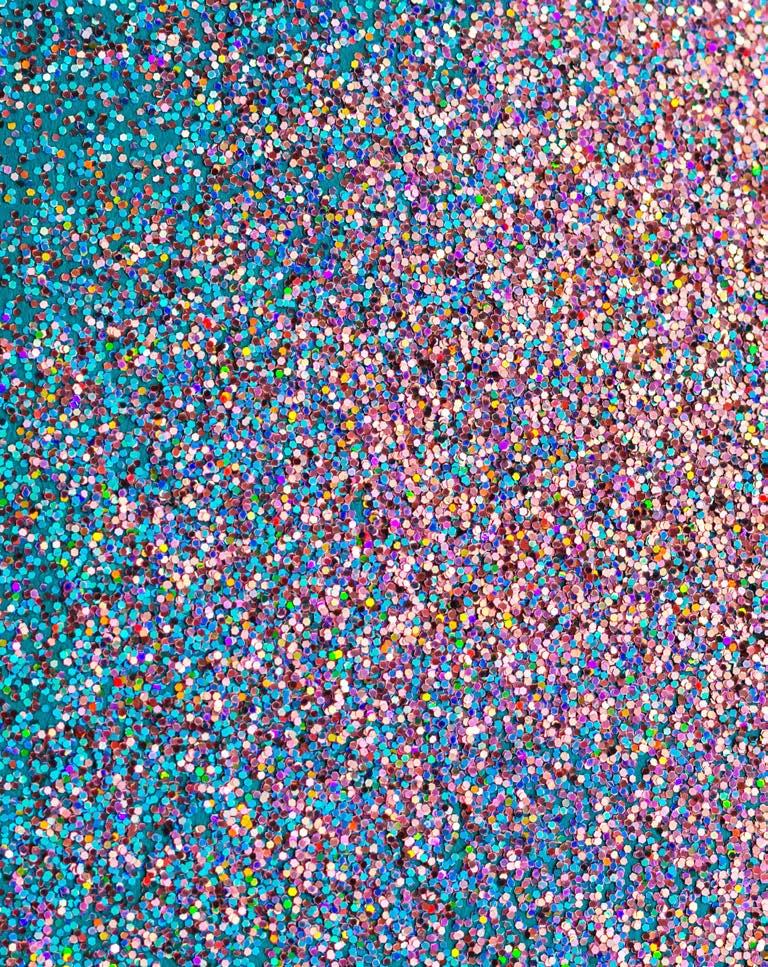
ISSUE 16 - 2022 - MORREO
Ella venía hacia mí con su sonrisa amplia, decidida y sincera. Yo me iba haciendo más pequeña con cada tramo que ella avanzaba. Demasiado cerca ya y sin ningún permiso, me abrazó, y me sentí incómoda. Su abrazo era fuerte, sincero y de una duración excesiva, muy poco políticamente correcto. ¡ME ENCANTÓ!
She came towards me with her broad, determined and sincere smile. I was getting smaller with every step she took. Too close now and without any permission, she hugged me, and I felt uncomfortable. Her embrace was strong, sincere and too long, not very politically correct. I LOVED IT!

OD Sky Bar

od-hotels.com
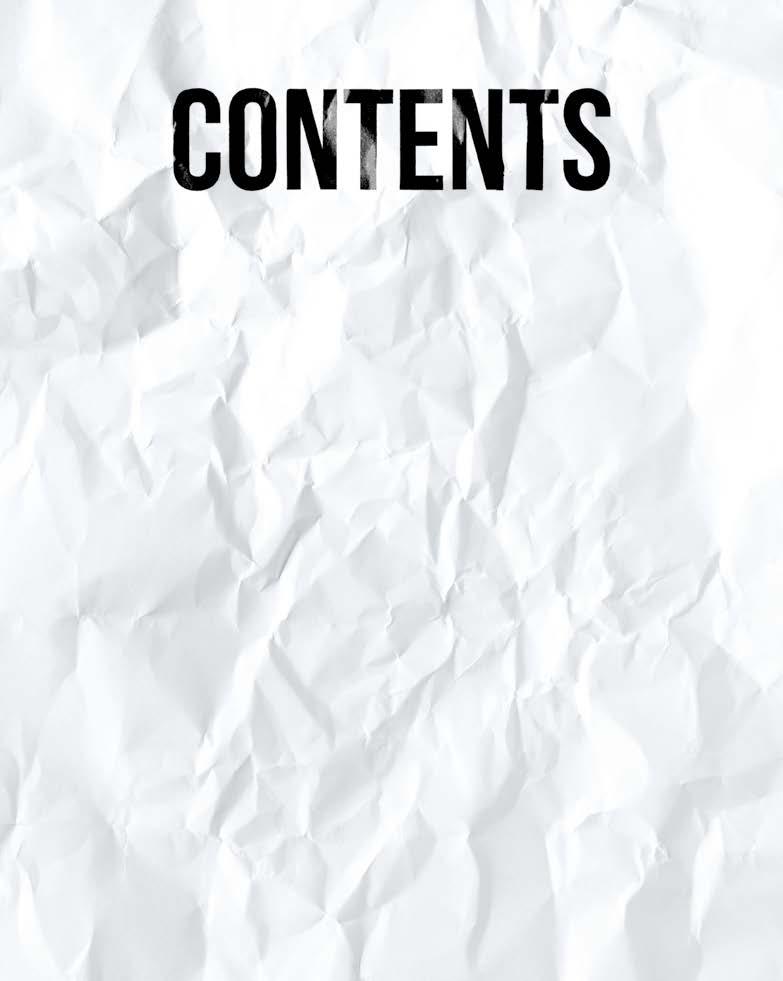
04 Sumario Fiesta & Bullshit y OD Group no se responsabiliza de las imágenes y opiniones vertidas por sus colaboradores. Queda prohibida la reproduccíon total o parcial de contenido sin previo aviso. DIRECCIÓN OD Group - CEO Marc Rahola Fiesta & Bullshit - CEO Teo Molina od-hotels.com fiestaybullshit.com ryans.es DIRECTORA MARKETING OD GROUP Silvia Aparicio DISEÑO GRÁFICO OD GROUP Álvaro González PUBLICIDAD (+34) 673 812 588 DISEÑO GRÁFICO REVISTA Josefa Calero Magazine@fiestaybullshit.com TRADUCCIÓN William McKenzie CONTACTO info@fiestaybullshit.com magazine@fiestaybullshit.com News Guillermo Lorca Ruta Gráfica Miss Melera Ocean Drive NFT Gallery Sónar Festival Andrea Oliva Hola Sundays! 5.0 Carmen Vidal Virgil Abloh Enter Salinas Stella Rahola Javier Ferreira b2b Diego Montiel Industrial Copera #Recortable Laboratorio Sonoro #18 08 010 020 026 029 036 038 050 054 061 070 074 082 084 086 ARTICLE PAGE

05
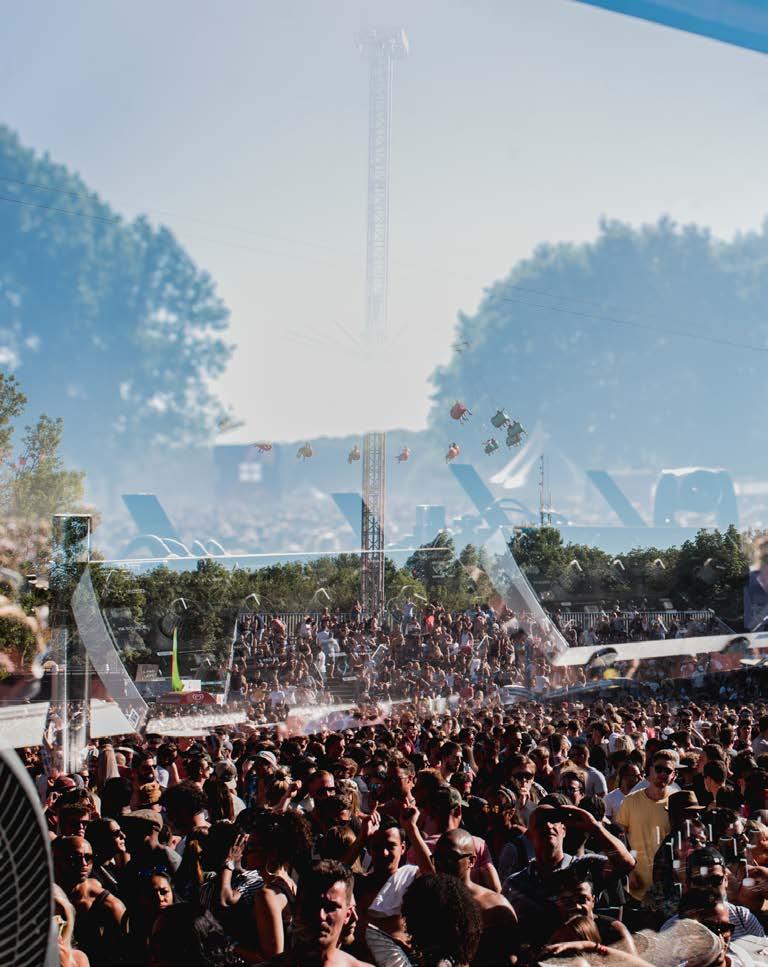 Photo: @mario_pintaAwakenings
Photo: @mario_pintaAwakenings

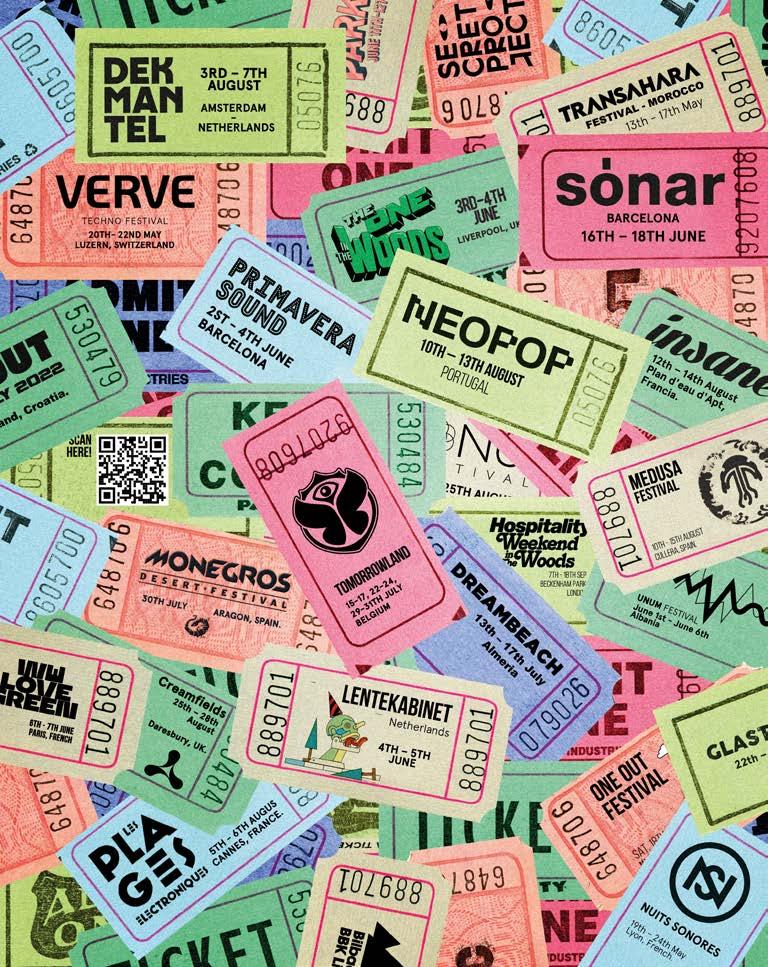
08 News
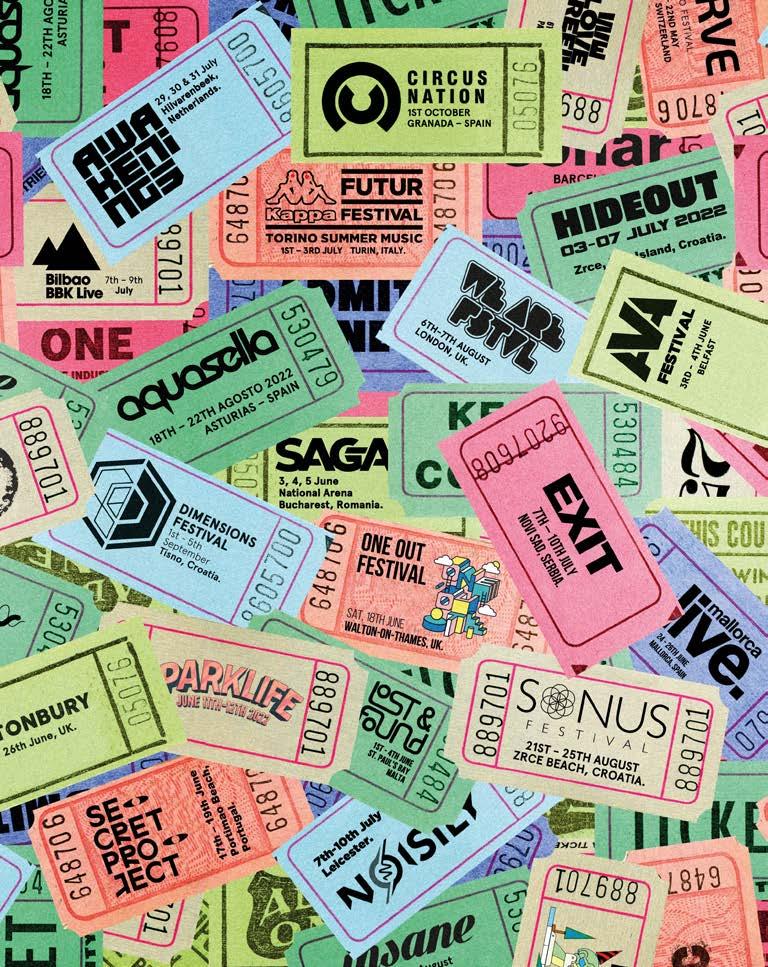
09
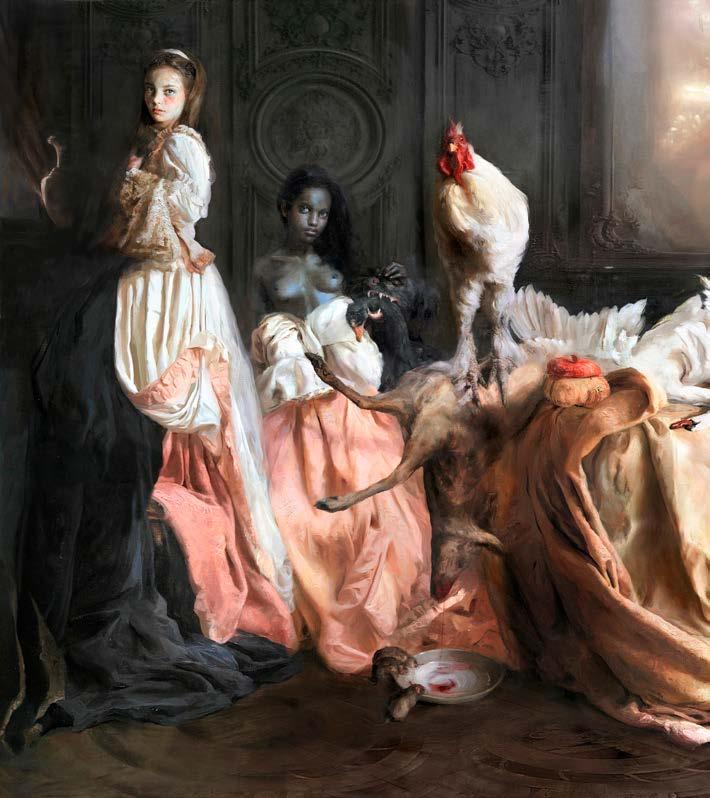
010 Interview
by Silvia Aparicio
Uno mira al artista Guillermo Lorca e inevitablemente piensa que sus enormes obras barrocas no casan con un artista tan joven y tan del siglo XXI. Aquí, su primera maravillosa contradicción porque sí, el trabajo de este pintor chileno esconde muchas más: cercano, onírico, violento, inocente, incómodo, misterioso… Muchas capas, mucha imaginación y virtuosismo a gran escala. Bienvenido a su fascinante y complejo mundo.
One looks at the artist Guillermo Lorca and inevitably thinks that his enormous baroque works do not suit such a young, typically 21st century artist. This is the first amazing contradiction about a Chilean painter whose works conceal many others; they are intimate, dreamlike, violent, innocent, uncomfortable and mysterious... There are so many layers as well as a lot of imagination and virtuosity on a grand scale. Welcome to his fascinating and complex world.
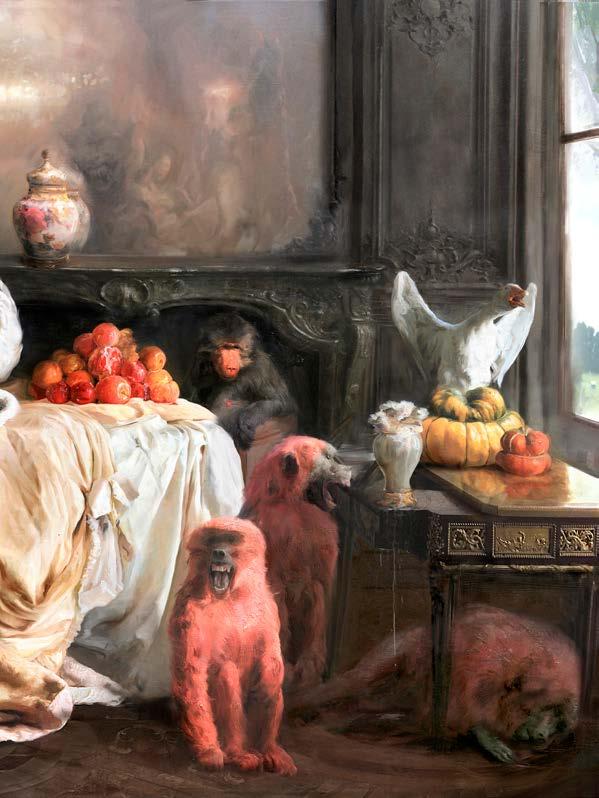
011
The Yaksha party - 2017 (Oil on canvas, 180 x 300 cm).
¿Qué querías ser de pequeño?
Paleontólogo y estudiar a los Dinosaurios.
¿Te han influido los cuentos que leías de pequeño en tu imaginario pictórico? ¿Y los libros de tu madre, la escritora Beatriz García-Huidobro?
Algunos cuentos me llamaban mucho la atención, pero estaba más influido por las ilustraciones, en especial las de “cuentos de antaño” de Perrault, ilustradas por Gustave Dor. Esas ilustraciones fueron fundamentales para todo mi imaginario futuro. Mi madre ha sido un soporte fundamental en mi formación, pero ante todo porque yo la veía pintar (era su hobbie cuando yo era chico), eso me llamaba mucho la
atención y también comencé a hacerlo. Además ella siempre me mostraba muchos libros de arte que me devoraba.
Después de estudiar un año en la universidad decidiste ir a Noruega, ¿por qué Noruega?, ¿y por qué con el pintor Odd Nerdrum? ¿Qué aprendiste o desaprendiste de él?
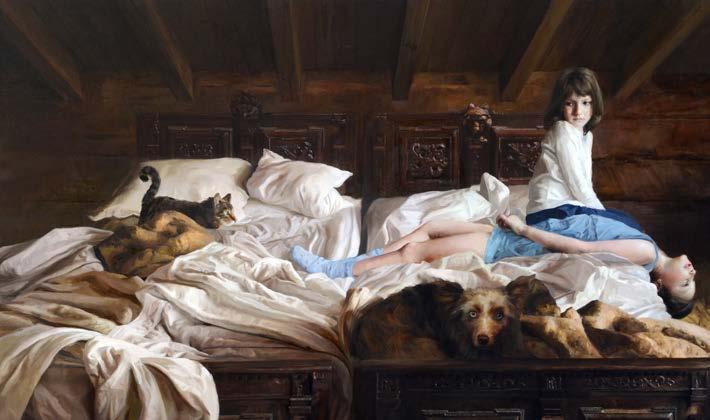
Fui a Noruega simplemente porque ahí vivía Odd, si hubiera sido otro país para allá me hubiera trasladado. Cuando vi su pintura por primera vez en una revista, quedé fascinado y pensé que él podía tomar discípulos como en la vieja escuela. No me equivoqué y así era, así que tuve la fortuna de poder aprender de él un tiempo. Creo que la lección más importante en mi estadía con Odd fue entender profundamente
su entrega personal con su arte y como encontrar ese espíritu en uno mismo para desarrollar su propia obra.
¿Qué te inspira además de lo anteriormente mencionado?
Muchísimas imágenes de grandes artistas de la historia, muchas cosas del interminable repertorio de la naturaleza, películas, ilustraciones, todo tipo de imágenes que me topo en distintos lugares. A veces me encuentro con alguna que evocan un sentimiento difícil de describir, tal vez algo similar a lo que asociamos con “la magia” de la infancia. Por otra parte, hay muchas otras sensaciones en las cuales las palabras no son un canal adecuado para expresarme y de ahí la necesidad de imágenes.
Una canción para escuchar con tu entrevista. // A song to listen to with your interview.

012 Interview
The twins I - 2013 (Oil on canvas, 120 x 200 cm).
What did you want to become when you were young?
A palaeontologist who studies dinosaurs. Have the stories you used to read as a child influenced your artistic imagination? And the books of your mother, the writer, Beatriz García-Huidobro?
Some stories really caught my attention, but I was more influenced by the illustrations, in particular Perrault’s “tales of yesteryear” illustrated by Gustave Doré. Those illustrations were fundamental in developing my entire future imagination. My mother has been a fundamental support in my education, but above all because I used to watch her painting (it was her hobby when I was a boy). That really attracted my
attention and so I started to do it, too. What’s more, she always showed me loads of art books that I eagerly read.
After studying for a year at university, you decided to go to Norway: why Norway? And why with the painter, Odd Nerdrum? What did you learn or unlearn from him?
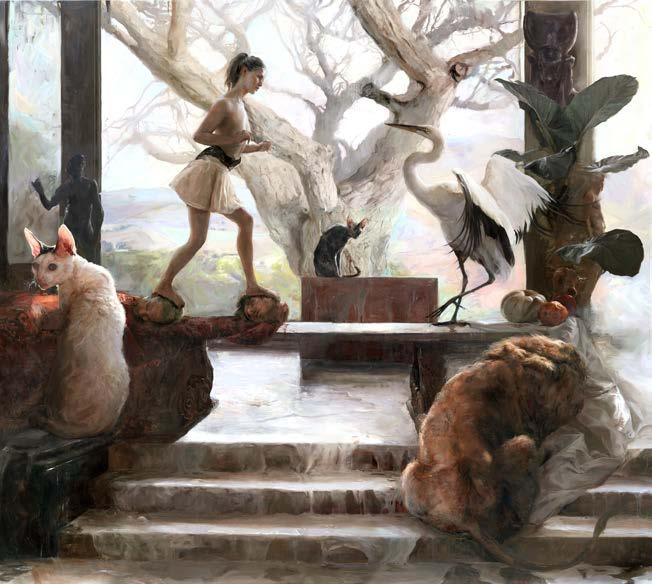
I went to Norway simply because Odd lived there; if it had been another country, I would have moved there. When I first saw his paintings in a magazine, I was fascinated, and I thought that he could accept disciples as they used to do in the past. I was not mistaken and that’s the way it was, so I had the great fortune to be able to learn from him for a while. I think that the most important lesson in my time with Odd
was to gain a deep understanding of his personal commitment to his art and how to find that spirit in oneself to develop one’s own work.
What inspires you apart from what is mentioned above?
All sorts of paintings by great artists in history, many things from the endless repertoire of nature, movies, illustrations, all kinds of works of art that I come across in different places. At times I come across one that evokes a feeling that is difficult to describe, perhaps something similar to what we associate with “the magic” of childhood. On the other hand, there are many other sensations for which words are not an adequate channel to express myself, thus giving rise to artistic expression.
013
The Enccounter - 2018/19 (Oil and acrylic on canvas, 210 x 230 cm).
¿Cómo es tu proceso de trabajo?
Tengo múltiples referencias de imágenes que me han llamado la atención clasificadas. Las reviso y me ayudan a que surjan las ideas. Ahí boceteo y planeo la producción de fotos de referencia para armar la composición que será el modelo de mi pintura. De ahí en adelante el proceso pictórico no es muy distinto a cómo se hacía hace 400 años.
Te comparan con grandes como Rembrandt, Velázquez, Rubens o Caravaggio. ¿Tú cómo te ves y cómo te gustaría que te vieran?
Me siento más que agradecido de tales comparaciones. En relación a cómo me veo a mi mismo, no estoy seguro, la imagen que se tiene de uno mismo tiende a estar bastante distorsionada por múltiples factores. Sí soy consciente de que he logrado gran parte de las metas que me propuse de más joven y cuándo parar y observar con calma, eso me sienta muy bien. Con respecto a la pregunta de cómo me gustaría que me vieran, espero que me vean como alguien auténtico en relación a su arte y, de hecho, siento que es así.
Tell us about your workflow.
I have catalogued masses of references to paintings that have caught my attention. I review them and they help me to come up with ideas. After that, I sketch and plan the production of reference photos to put together the composition that will be the model for my painting. From that point on, the process of painting is not very different from how it was done 400 years ago. You have been compared to masters such as Rembrandt, Velazquez, Rubens, or Caravaggio; how do you see yourself, and how would you like to be seen?
I am more than grateful for such comparisons. As far as how I see myself, I am not sure, the image that one has of oneself tends to be quite distorted owing to several factors. I am indeed aware that I have achieved many of the goals that I set for myself when I was younger, and when I stop and calmly observe, that feels really good. As far as the question of how I would like to be seen is concerned, I hope to be regarded as someone authentic in relation to their art: in fact, that is how I feel.
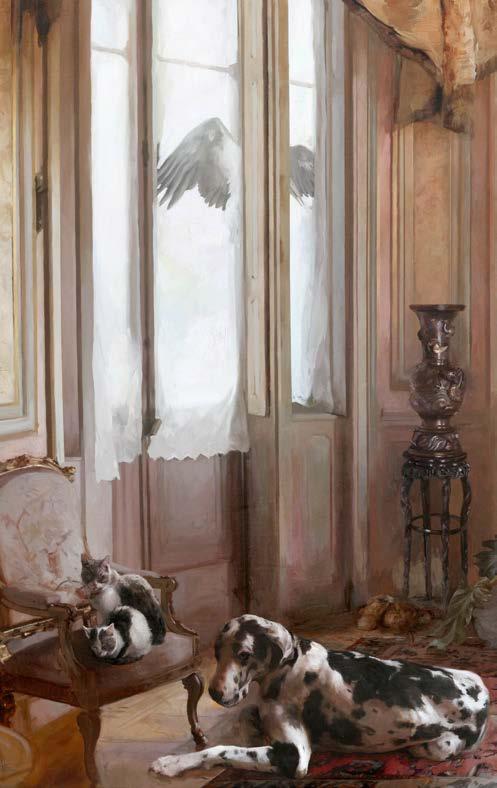
014 Interview

015
The Healer - 2020 (Oil on canvas, 180 x 300 cm).
Pregunta tonta: ¿Por qué eliges formatos tan grandes?
La composición que planeo antes manda el formato, me gusta mantener las proporciones cercanas a la escala natural y muchas composiciones me exigen un formato grande.
Pregunta inevitable: ¿Con qué estás ahora? ¿Algún proyecto nuevo?
Estoy en proceso de cierre de futuras muestras y en un periodo creativo fructífero, armando varias composiciones y desarrollando ideas.
Pregunta cotilla: ¿Con qué artista te gustaría cenar y por qué? (Vivo o muerto).
Rubens, me hubiera encantado saber de primera fuente su forma de mirar la vida, ya que la suya me parece muy interesante. Hasta dónde sé era una persona muy disciplinada, carismática, pasional y culta (se puede ver en sus pinturas), pero además es sabido que era muy sociable, de hecho le asignaron misiones diplomáticas. Todo esto mientras maneja un taller con muchos ayudantes y trataba con todo tipo de cortesanos, me parece

notable su capacidad pero en especial el contenido de sus obras, sería lindo conversar con él.
Pregunta sin pensar: ¿Quienes son esas niñas y por qué muchas me miran fijamente?
Pienso que son una parte de mi yo que se manifiesta con esa forma, son una suerte de espíritu antiguo, profundo y muy valioso, tal vez la personificación de una suerte de alma.
Pregunta detalle: En el cuadro de La Curandera, el del gorila hay una
manzana cayendo y en el cuadro de “The Enccounter” la chica pisa dos cabezas humanas y una es tu autorretrato. ¿Tienen estos detalles alguna explicación?
La curandera se llama el primero y la manzana pienso que está ahí para mostrar la inquietud del gorila, que está botando cosas de la mesa en la que está sentado. En el caso de las cabezas, hay mucho para que el espectador lo interprete a su manera, la historia no la cierro yo. En ese cuadro de todas formas creo que hay un juego erótico entre el personaje de la chica sobre las cabezas, algún tipo de dominación.
016 Interview
A silly question: Why do you choose such large formats?
The composition I planned beforehand dictates the format. I like to keep the proportions close to a natural scale, and many compositions require a large format.
The inevitable question: What are you doing now? Any new project
I am in the process of closing future exhibitions and in a fruitful creative period, putting together various compositions and developing ideas.
A gossip question: Which artist, dead or alive, would you like to have dinner with and why?
Rubens, I would love to have known firsthand the way he looked at life, since his perspective seems very interesting to me. As far as I know, he was a very disciplined, charismatic, passionate and educated person (you can see it in his paintings). However, it is also known that he was very sociable, in fact, he was assigned diplomatic missions. All this while he was running a workshop with many assistants and dealing with all kinds of courtiers. Not only does his talent seem remarkable
to me, but especially the content of his works; it would be lovely to talk to him.
A question without thinking: Who are these girls and why are so many of them staring at me?
I think that they are a part of my being that manifests itself in that form; they are a kind of ancient, deep and very valuable spirit, perhaps the personification of a kind of soul.
A detailed question: In the painting, La Curandera, the one with the gorilla, there is a falling apple, and, in the
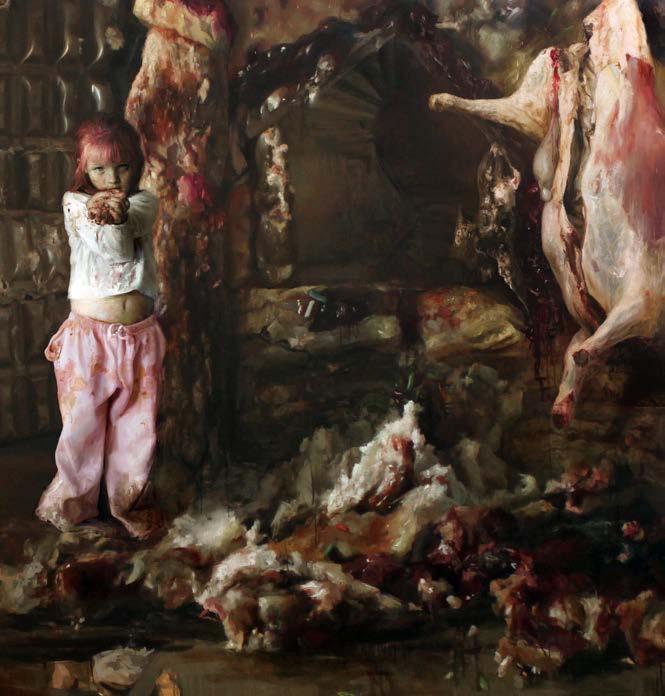
painting, The Encounter, the girl steps on two human heads and one of them is your self-portrait. What is the story behind these details?
The first one is called the healer, and I think the apple is there to show the unease of the gorilla, who is throwing things off the table where he is sitting. In the case of the heads, there is much for the viewer to interpret in his own way: I do not close off the story. In any case, with that painting I think that there is an erotic game going on between the character of the girl on the heads, some kind of domination.
017
Little house of sweets2011 (Oil on canvas, 160 x 300 cm).
En tus obras de “Esplendor en la noche” casi siempre hay animales pero más que como un bodegón de naturaleza muerta están más que vivas y tienen un toque onírico. ¿Cuánto de vida o muerte hay en tus obras?
Intento equilibrarlas pero prefiero pensar que hay algo más de vida, aunque sea muy poco.
Sexo, sangre, neblina, surrealismo, sueños, infancia, poder, belleza... ¿Qué palabra te representa más? (Añade o quita al gusto).
TERNURA, VIOLENCIA, JUEGO, EROTISMO, COMPASIÓN, BELLEZA, MUERTE, MAGIA Y MISTERIO.
¿Día o noche, naturaleza o humanidad, amor o terror, violencia o ternura, interior o exterior? Está claro que te gusta la dualidad pero, ¿te gusta el equilibrio o lo encuentras aburrido para el arte o la vida?
Es que el equilibro en las obras yo lo veo como algo entremezclado aparentemente aleatorio que busca de alguna forma equiparar distintas fuerzas que se contrastan. La dualidad me llama más la atención que el equilibrio en sí mismo. Cuando se trata de mi vida personal, el equilibrio sí lo encuentro importante y lo intento practicar a pesar de mis debilidades.
Hablando de dualidad, ¿el futuro del arte es digital o siempre será más importante el arte físico?
Pienso que van a convivir tal como ahora lo hacemos con otros ámbitos. Lo digital tiene terreno para crecer bastante mientras vayan mejorando las experiencias inmersivas, habría que ver qué pasa con eso, tal vez en el futuro no se pueda distinguir una de la otra.
En tu caso parece que se rompe la regla del artista atormentado al que solo se valora después de su muerte, ¿crees que ha habido un cambio en este aspecto?
Pienso que la mayoría de los artistas reconocidos lo fueron en vida, en especial si uno revisa los anteriores al siglo XIX. Pasa que han habido algunas historias trágicas que han llamado mucho la atención y nos quedan esos estereotipos. Ahora, de lo de atormentado no sé si me salvo.
¿Qué cambiarías del mundo del arte?
El enfoque de lo que se comunica sobre el arte al mundo está en exceso asociado al dinero, récord de precios y esas cosas, y poco a la reflexión y otras variables, sería bueno algo más de contrapeso.
In your works entitled Esplendor en la noche there are almost always animals, but rather than being like still life paintings of dead nature, they are more than alive, possessing a dreamlike touch. How much of life or death is there in your works?
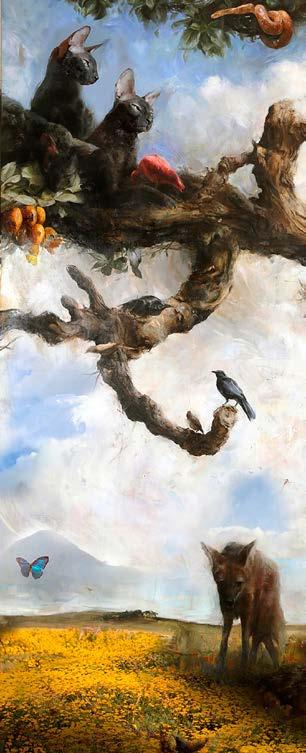
I try to balance them, but I prefer to think that there is more life, even if it is very little.
Sex, blood, mist, surrealism, dreams, childhood, power, beauty... What word represents you the most? (add or remove as you see fit).
TENDERNESS, VIOLENCE, PLAY, EROTICISM, COMPASSION, BEAUTY, DEATH, MAGIC & MYSTERY.
Day or night, nature or humanity, love or terror, violence or tenderness, interior or exterior? It is clear that you like duality but do you like balance or do you find it boring for art or life?
The fact is that I see the balance in the works as something intermingled and apparently random that seeks in some way to equate different forces that are contrasted. Duality catches my attention more than balance in itself. When it comes to my personal life, I do find balance important, and I try to practice it despite my weaknesses.
And speaking of duality, is the future of art digital or will physical art always be more important?
I think they will coexist as we do now in other areas. Digital art has room to grow a lot as immersive experiences improve. We would have to see what happens with that; perhaps in the future, it will not be possible to distinguish one from the other.
In your case, it seems that the rule about the way tormented artists are only recognised after their death has been broken; do you think there has been a change in this respect?
I think that most of the recognised artists were so in life, especially if one reviews the ones prior to the 19th century. The thing is that there have been some tragic stories that have drawn a lot of attention and we are left with those stereotypes. Now, as far as the bit about tormented is concerned, I don’t know if I’m saved.
What would you change about the art world?
The focus of what is communicated about art to the world is excessively associated with money, record prices and things like that and very little with reflection and other variables: it would be good if that were more balanced.
018 Interview
GUILLERMO LORCA GARCÍA HUIDOBRO B. Santiago, Chile, 1984. @guillermolorcagarcia linktr.ee/guillermolorca
Actualmente puedes ver “Esplendor en la noche” en Moco Museum Barcelona hasta octubre del 2022. // Currently, you can see “Esplendor en la noche” at the Moco Museum in Barcelona up until October, 2022.

019
Man of the cats - 2015/19 (Oil on canvas, 340 x 450 cm).
El diseño del sonido de València es el primer estudio en adentrarse en toda la imaginería desarrollada en torno a la escena de clubs nacida en los años 80 en la ciudad de Valencia, que ya entrados los años 90 acabaría conociéndose a nivel popular como ‘Ruta del Bakalao’.
Si bien al mencionarse toda esta historia se tiende a pensar en un primer momento en aspectos relacionados con la música, lo cierto es que la parte gráfica y de diseño, en
buena medida olvidada, fue ampliamente importante. Especial mención de serigrafía de Armando Sivestre junto a su mujer Elisa Ayala, que desarrollaron gran cantidad de carteles de Barraca, Espiral entre las más destacadas.
Paco Roca, Mariscal, Francis Montesinos, El Hortelano, Sento Llobell, Ramón Marcos, Edu Marín, Paco Salabert, Daniel Torres, Mique Beltrán, Micharmut, Gonzalo Mora... Son solo algunos de los artistas ampliamente
relevantes a día de hoy que desarrollaron carteles para las salas valencianas a lo largo de estos años, en los que la efervescencia creativa de la ciudad del Turia fue una seña de identidad en plena resaca de un franquismo todavía muy presente.
Es por ello que esta obra es pionera en rescatar todo este desarrollo artístico sin precedentes del estigma que en sus etapas tardías acabó afectando al fenómeno social de la Ruta.
A graphic route.
The sound design of Valencia is the first study to delve into all the imagery that developed around the club scene that was born in the 80s in the city of Valencia, which by the 90s would end up becoming popularly known as ‘Ruta del Bakalao’.
Despite the fact that when this entire history is mentioned, the first thing one tends to think about are those aspects related to music, the truth is that the graphic and design parts, which have been largely forgotten, were hugely important.

Paco Roca, Mariscal, Francis Montesinos, El Hortelano, Sento Llobell, Ramón Marcos, Edu Marín, Paco Salabert, Daniel Torres, Mique Beltrán, Micharmut, Gonzalo Mora... Are just some of the highly relevant artists to this day who made posters for the Valencian venues throughout those years, during which the creative effervescence of the city on the Turia River was a hallmark of identity in the very midst of a hangover from a Francoism that was still very present.
That is why this is a pioneering work in rescuing all this unprecedented artistic development from the stigma that—in its later stages— ended up affecting the social phenomenon of la Ruta.
020 Report
“A lo largo de la década de los 80 y parte de la de los 90, floreció en Valencia una subcultura juvenil de ámbito local que recorrería un camino gradual desde lo minoritario hasta verse transformada en un fenómeno social de masas.
Over the course of the 1980s and part of the 1990s, a local youth subculture flourished in Valencia that would follow a gradual path from something of minority interest to the point that it turned into a mass social phenomenon.

021
Bajo el difuso paraguas del término accidental Ruta del Bakalao, que acabaría definiéndolo, se desarrollaron numerosas disciplinas artísticas en un sentido particular, creativo e innovador. Si bien es probable que sean los aspectos relacionados con la música lo primero que acuda a nuestra mente en esta historia, lo que este trabajo pretende desentrañar es un sentido vagamente explorado y que bien merece ser puesto en valor.
Under the diffuse umbrella of the accidental term Ruta del Bakalao, which was to end up defining it, several artistic disciplines were developed in a particular, creative and innovative sense. Even though it is likely that those aspects related to music are the first thing that comes to our mind in this story, what this work tries to unravel is a vaguely explored meaning that fully deserves to be given its place.
Franco’s death and the subsequent process of transition breathed airs of political and social renewal into a country that had been isolated for decades from its context.
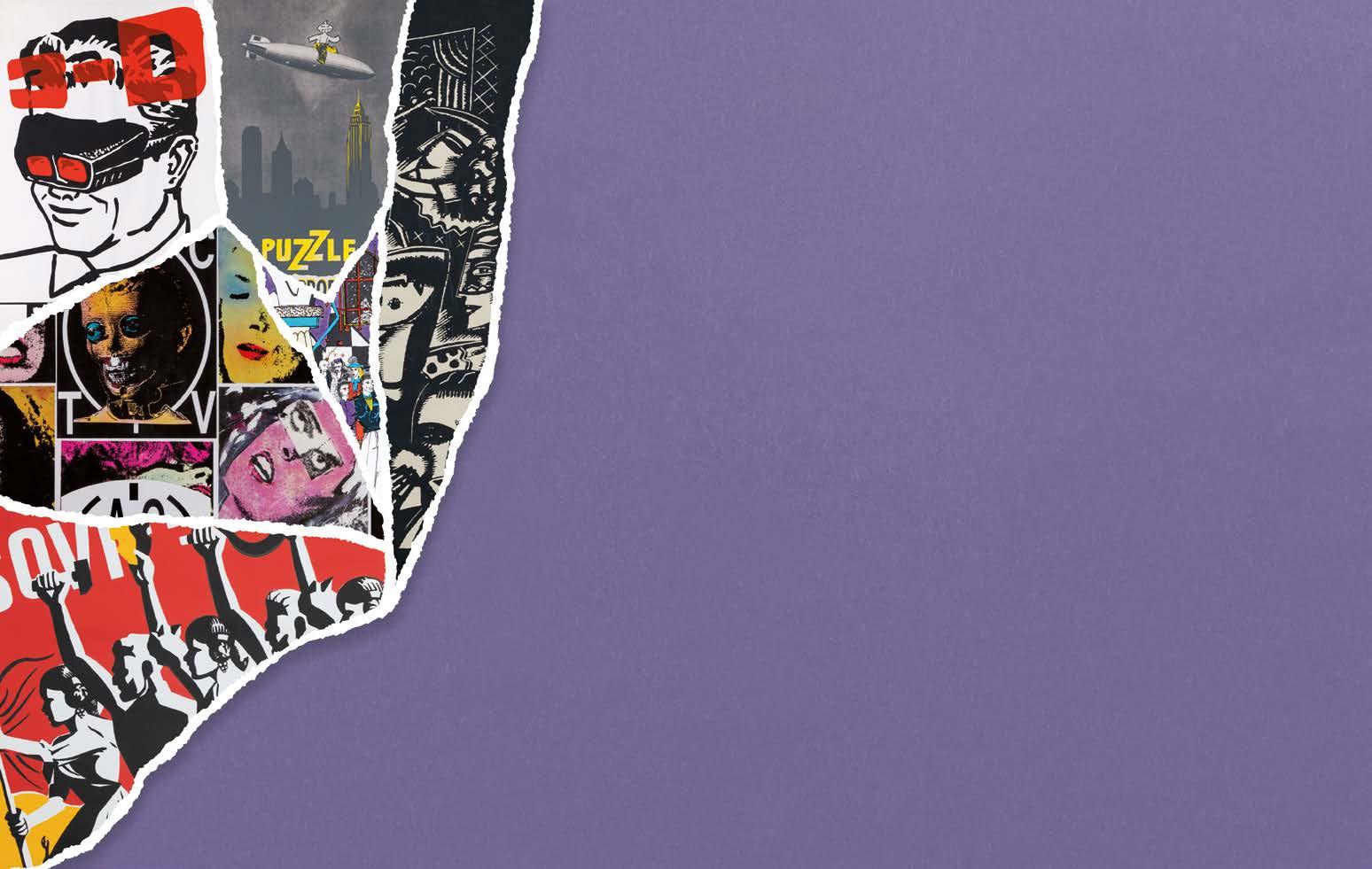
022 Report
“La muerte de Franco y el posterior proceso transicional insufló aires de renovación política y social a un país aislado durante décadas de su contexto.
After the restlessness that was typical of the uncertainty of change, and a final blow in the form of an attempted coup d’état, the 1980s presented themselves as ideal for a gradual relaxation. It was the moment when numerous youth movements emerged in parallel at the state level demanding modernity, above all in terms of aesthetics, as one of the hallmarks of identity that should infuse a country in its democratic infancy. In the case of Valencia, this explosion meant the birth of a subculture that found its space to develop in clubs and discos.
Although it may be surprising, it was these artists who came to make up a large part of the members of the so-called New Valencian School of cartoonists who would begin to provide this nascent circuit—still very much a minority—with images and a visual identity.


Tras el desasosiego propio de la incertidumbre del cambio, y un coletazo final en forma de intento de Golpe de Estado, los años 80 se perfilaron como idóneos para una distensión paulatina. Fue el momento en que surgieron en paralelo numerosos movimientos juveniles a nivel estatal que reivindicaban la modernidad, sobre todo estética, como uno de los sellos de identidad que debía impregnar a un país en pañales democráticos. Esta explosión supuso, en el caso de Valencia, la génesis de una subcultura que encontró su espacio de desarrollo en clubs y discotecas.
Aunque pueda resultar sorprendente, fueron buena parte de los integrantes de la denominada Nueva Escuela Valenciana de cómic los que comenzarían a dotar de imágenes e identidad visual a este incipiente circuito todavía muy de minorías.
En su materialización física, buena parte de la cartelería desarrollada a lo largo de esta primera década buscaría la innovación no solo en aspectos estéticos o conceptuales, sino también formales. Los modos de trabajo, en ocasiones cercanos a la pura artesanía, alumbrarían piezas de un valor artístico inconmensurable.
In its physical manifestation, a large part of the artwork developed over the course of that first decade would seek innovation not only in aesthetic or conceptual, but also formal terms. The working methods—that were on occasion close to pure craftsmanship—would illuminate pieces of immeasurable artistic value.
A GRAPHIC ROUTE
‘The sound design of Valencia’
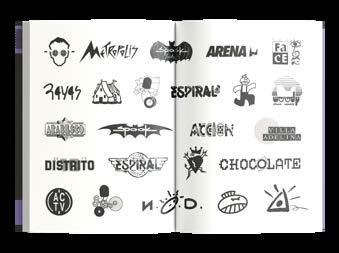
Authors: Moy Santana y Antonio José Albertos
Prologue: Paco Roca
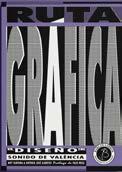
Cover design: Áusias Pérez
Editorial: Barlin Books
023

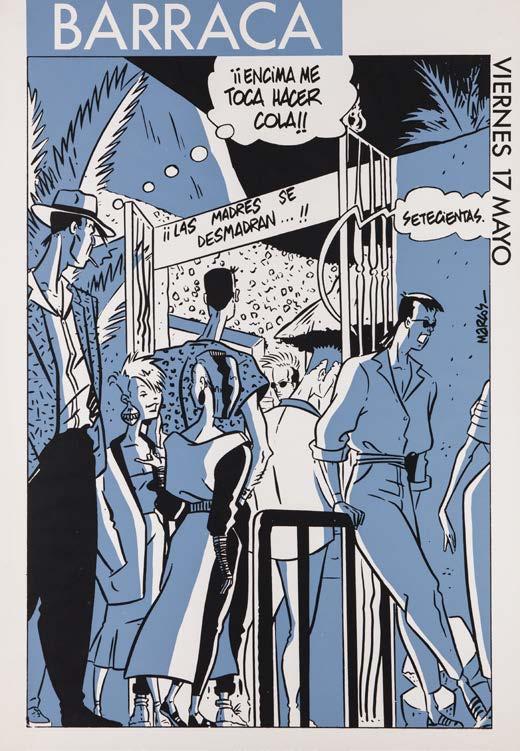
024 Report
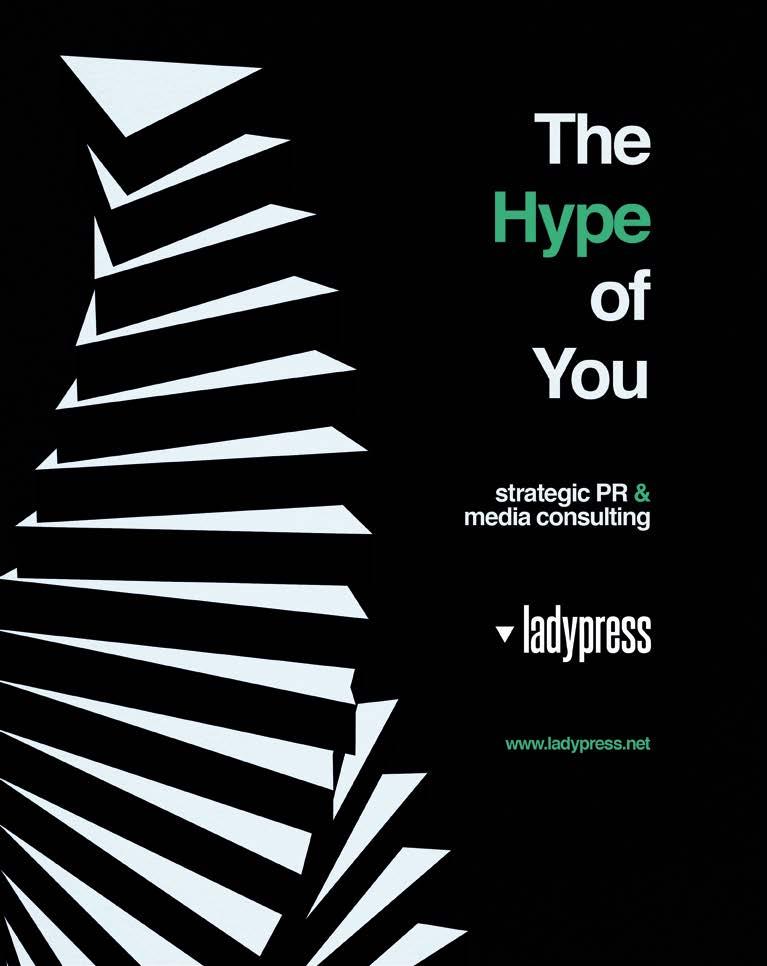
Hello Miss Melera, a pleasure to have you at Fiesta&Bullshit. We love your music, but we have enjoyed you little on the island, what is your relationship with Ibiza?
Thank you! That make me smile. I guess it started 10 years ago - exploring the island with friends and since the first moment I was in love. The vibe - food and the ever-changing horizons to watch. Love it and enough reasons to come back, at least once a year to relax.
After visiting - I’ve been also invited to play several times - it all begun at KM5 – played at Heart and Dystopia Ushuaia a few years ago. Can’t wait to bring my music again ..
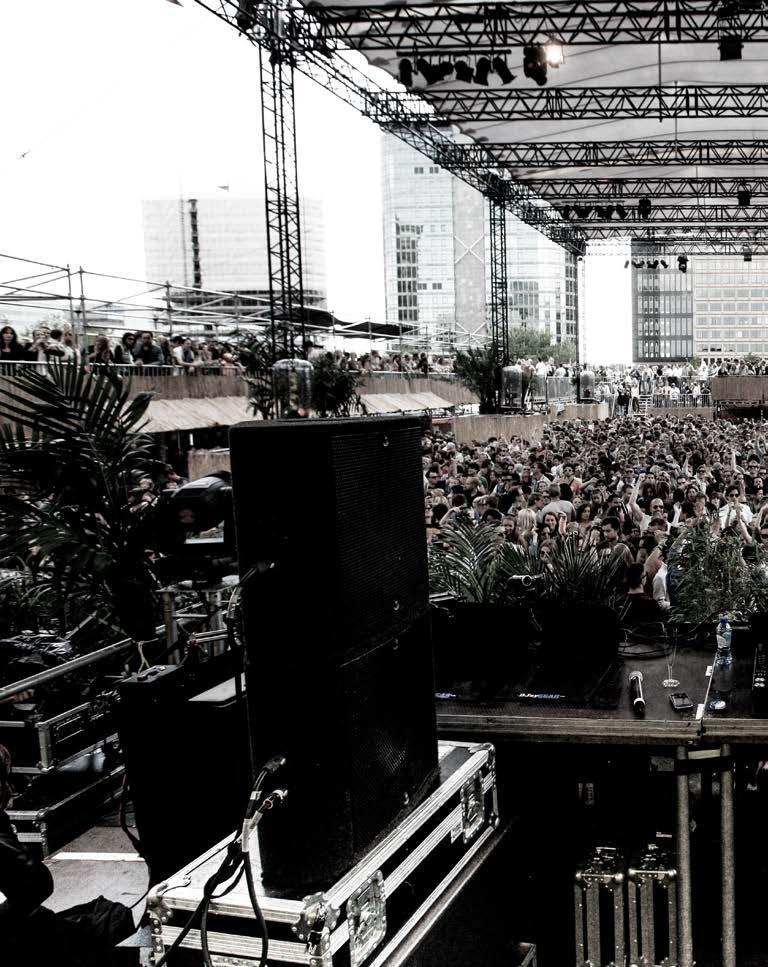
How would you like your next time on the island to be?
As long if possible! (laughs).
You are Dutch. How is the electronic scene (melodic, deep, house) in your country right now?
After such a long time of being locked down because of the corona regulations – we are finally open again. I’ve my fingers crossed this will be forever from now on. Overall, the scene is very diverse – with many sub genres and different styles, which is interesting and keeps it vibrant.
New generations/new school artists? What do you think? What artists/labels are surprising you?
New label “Inner Layers“ from Alex Preda –something new and exciting. His first release is absolutely a favourite of mine. Also – I’m a big fan of Jonas Saalbach’s “new” label Radikon.
An adjective/word to qualify:
Hernan Cattaneo: Charismatic. Guy J: Humble. Nick Warren: “Gezellig”. Eelke Kleijn: Allrounder. Olivier Weiter: Rockstar.
In which cities/clubs/countries do you feel more comfortable in them?
South America is one of my favourite continents. The vibe is always amazing and fans are so passionate - literally from the first to the last minute.
What does Colourizon mean to you?
Colourizon is my own concept and started 10 years ago as a podcast/radio show and not much later with events. I studied at the art academy and for me this is a way to combine art with music. I’ve always made pictures and artworks myself.
During live events, movies showed as visuals are captured from my touring experiences. It’s a creative concept – it’s always excited to brainstorm about new ideas and it never stop – same as music.
Tell us about your Colourizon events and radio show. How did they come about?
Colourizon started as a monthly radio show when Proton USA asked me to host a show back in 2012. Not much later I started with events too. The name is a blend from two things that are very important for me in life. Colours and Horizons and when you combine these two its “Colourizon”.
I always had an idea about visualizing horizons during my live events – this wasn’t and still isn’t an easy thing to achieve but until now always managed to do this and I’m looking forward to celebrate the 10th anniversary this year.
How is your studio? How do you have it organized? Favorite Synthesizer?
I’ve always been happy with my Komplete Kontrol Keyboard – Monkey Banana speakers –Moog Sub 37 CV - but I mainly use soft synths – like Omnisphere – Diva – Repro – Supboom bass...
Who did you listen to growing up and do they influence your productions at all today?
I’m an 80’s kid and I’m always in love with synthesizer sounds from the 80’s. I grew up with Genesis – Toto – Simple Minds for example - melodies are the key for me and I’ve always been driven and inspired by them.
026 Interview
FIRST PLACE WHERE YOU PLAYED? AZOTOD –DE MEERN2003
BEST CLUB EVER? DE MARKTKANTINE, AMSTERDAM.
YOUR BEST SESSION WAS ON? DGTL 2014 –CLOSING SET. I STILL HAVE A BIG SMILE ON MY FACE WHEN I THINK BACK TO THIS MOMENT.

THE BEST DJ YOU’VE EVER SEEN? I’M SORRY BUT CAN’T DECIDE.
YOUR FAVORITE PLACE IN AMSTERDAM? ON MY BIKE THROUGH THE CITY DURING SUMMERTIME.
027
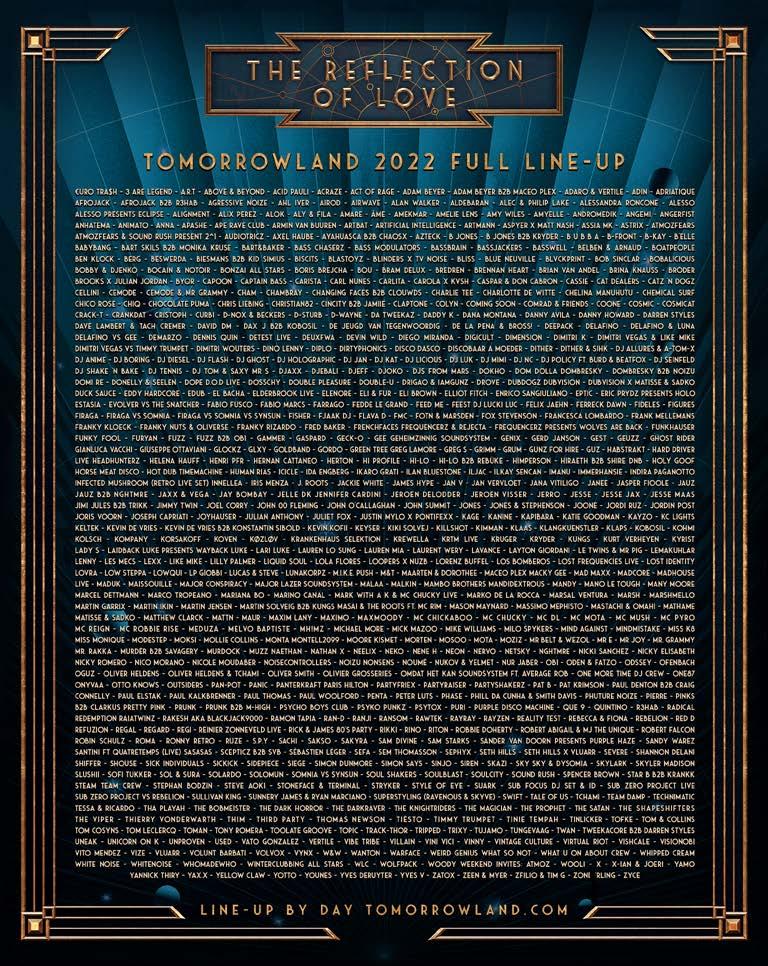
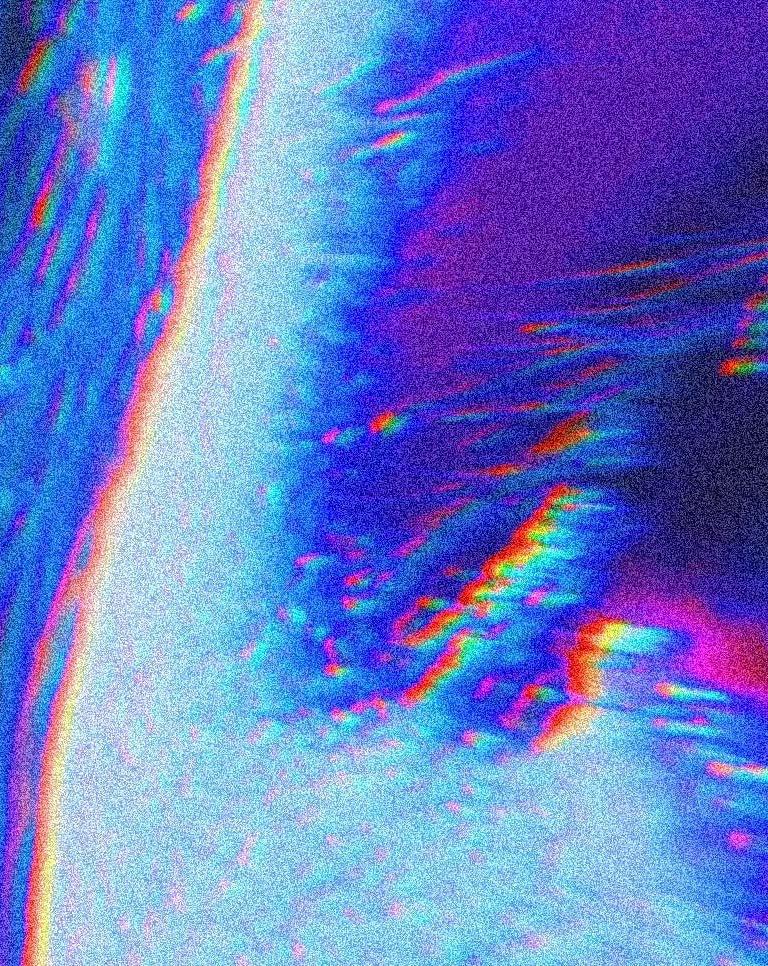

@oce andriv eN FT 029
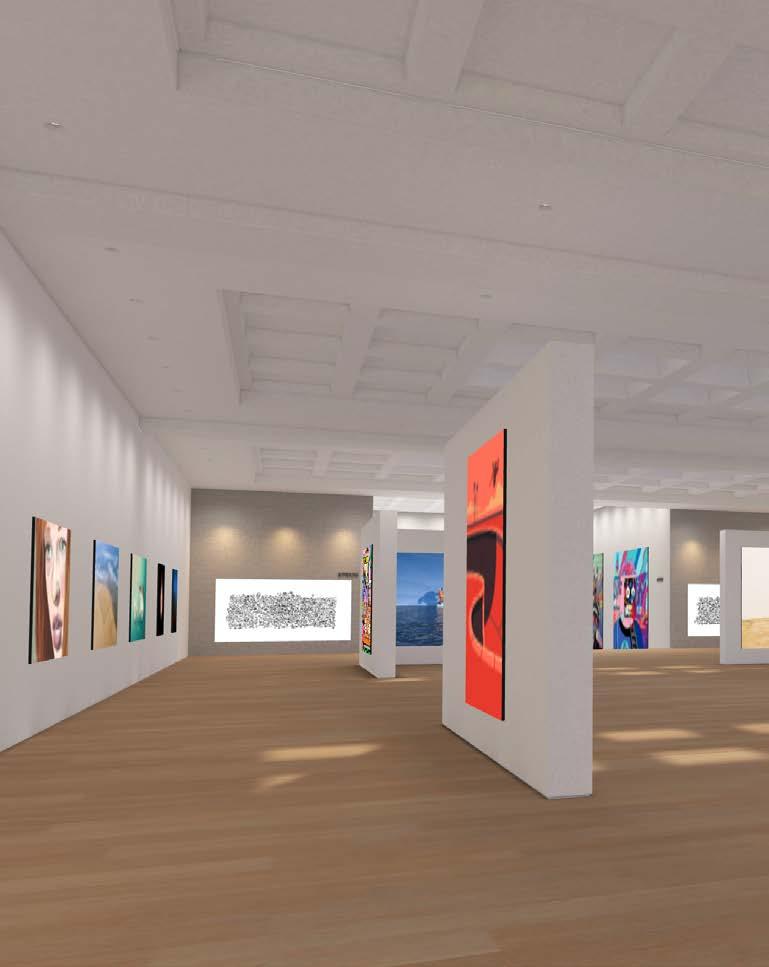

030 Report
In our virtual gallery on Cyber, everyone can visit the exhibitions from any mobile device, tablet, computer or even VR glasses where we show our NFTs in a fully immersive experience.
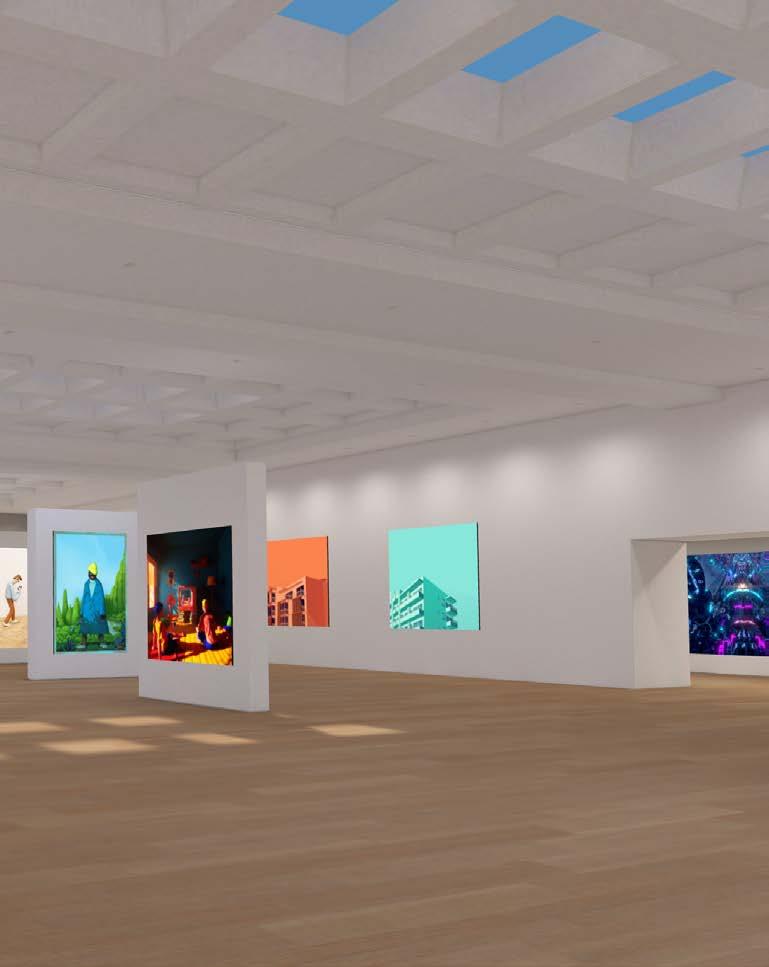
Suspended in the sky, our new gallery “Altitude” is a modern gallery overlooking a horizon of clouds. Created by 0xWolfgang, the first metaverse architect to build on the Cyber platform.
We continue to support local artists while acquiring artworks by international ones.
The collection features pieces from Ethereumbased marketplaces such as Foundation, Rarible and Opensea, as well as on Hic Et Nunc and Objkt.com, based on Tezos.
RARIBLE FOUNDATION HIC ET NUN C 031
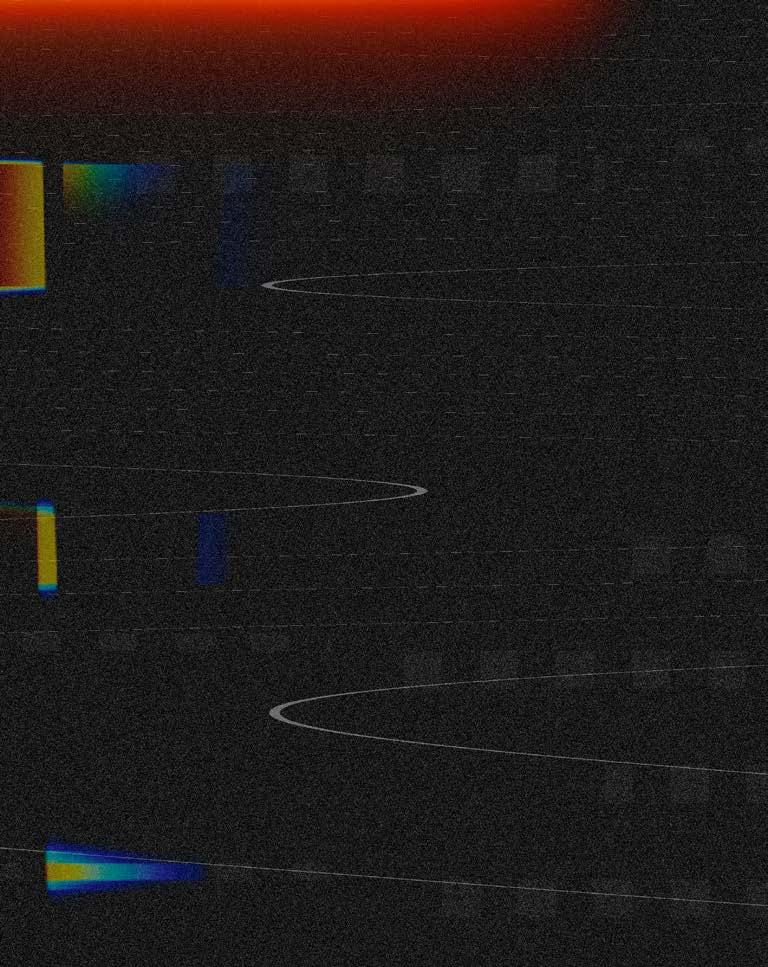


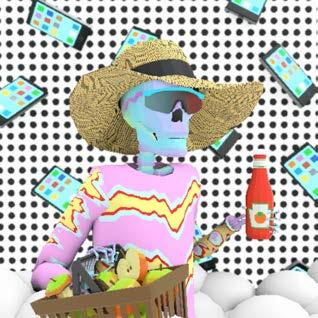
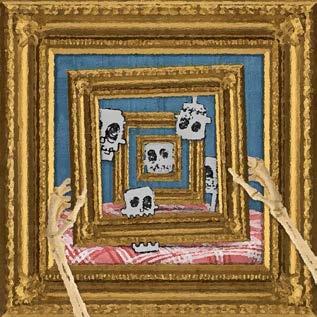
032 Report
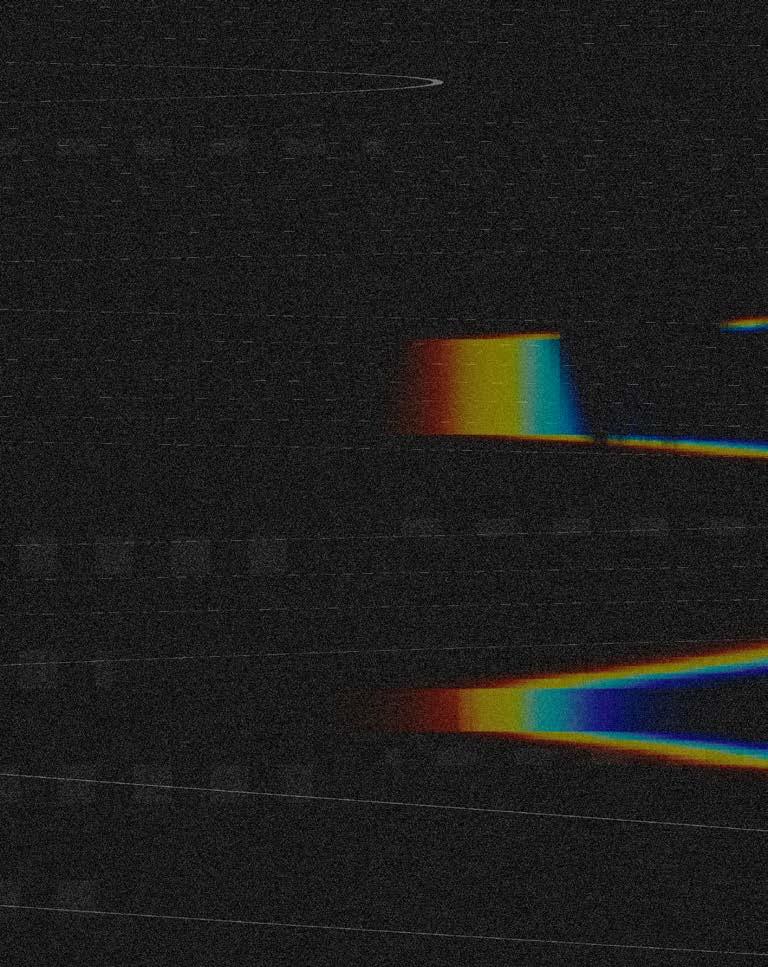
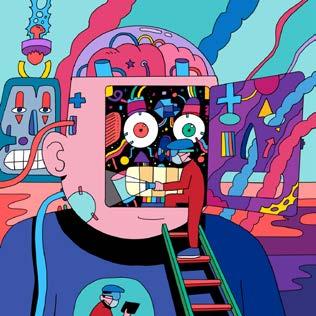
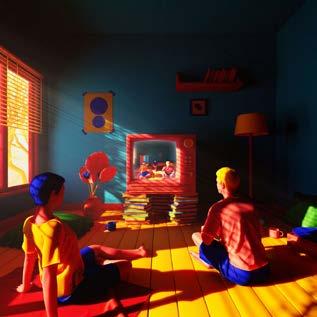
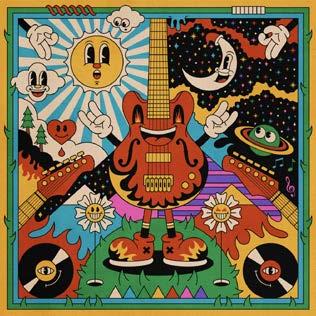
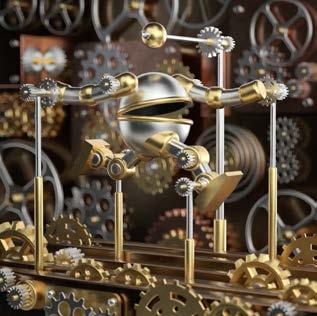
033
Q4 _ 2021
Global gallery launch NFT Award
Media Coverage
Cointelegraph, Forbes, Yahoo Finance, Diario de Ibiza...
Q3 _ 2021
Social media and nft profiles launch
Ocean Drive NFT
-First purchases & donations.
Gallery 1.0
-40 artwork capacity. -Local artist support.
Q1 _ 2022 Gallery 2.0: Expansion
Tourism Innovation Summit: Digital Innovation Finalists -120 artwork capacity. -Exclusive gallery rooms.
Q2-Q4 _ 2022
OD Hotels
NFT exhibitions
-Lobby VR headsets. -Digital frames. -Hotel suite rooms takeover.
2024
Ocean Drive
metaverse Hotel
Create our own land, digital OD Hotel, including NFT expos & digital interactions.
Giveaway NFT Airdrop
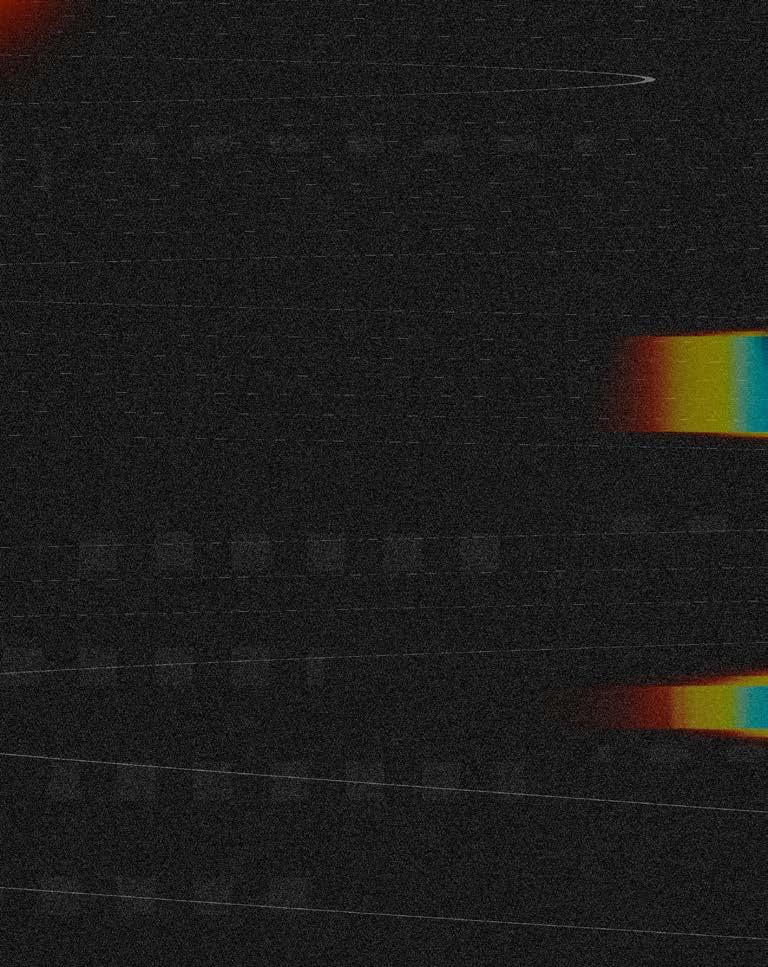
Regular art purchases
-Augmented budget for artworks.
2023
Physical galleries
-Pop-up exhibitions. -Museum collaborations. -Events.
034 Report
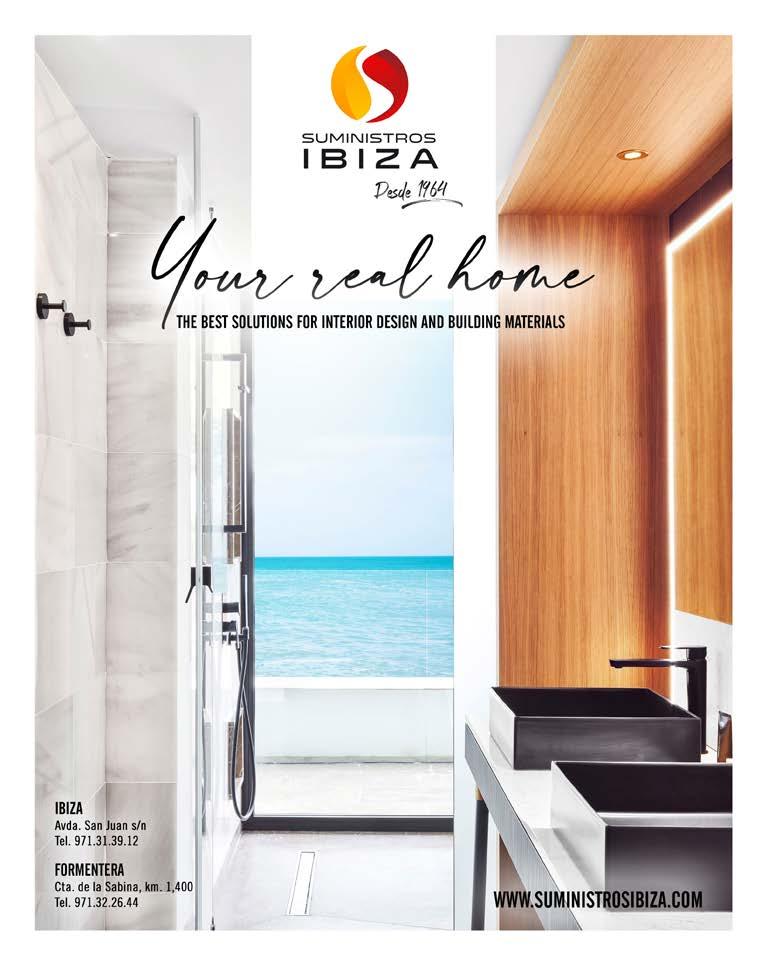
Nu Genea’s music sounds like a postcard from a faraway place: an esoteric collection of grooves, purpose built for sun-dappled dancefloors and blushing sunsets. Yet, in truth their breakout album “Nuova Napoli” is exactly what it says it is: a revival of the forgotten golden era of Naples funk, jazz and soul. Massimo Di Lena and Lucio Aquilina are master distillers, as much as they are freak musical talents. They’ve worked with the king of afrobeat, Tony Allen, and toured the world performing, collecting and listening, but what sets them apart is their ability to reduce all those inputs into something which sounds distinctly Neapolitan. Their jazzy funk is lithe and nimble, but weighted with more than a little of that expansive Italian spirit (whisper it quietly, but there’s a bit of prog to their sound). For their first appearance at Sónar, the duo will perform with a full live band, fleshing out the grooves of their catalogue and debuting new tracks under the Barcelona sun.
Only once before has this happened... Back in December 2017, for a session broadcast on Rinse France. A meeting in the booth that will be music to the ears (literally) for lovers of indie-dance, dark electronica and space disco.
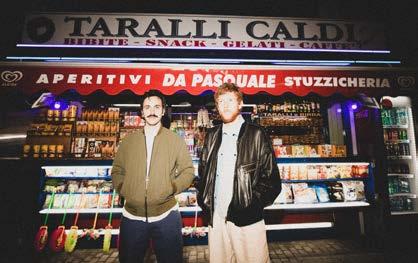
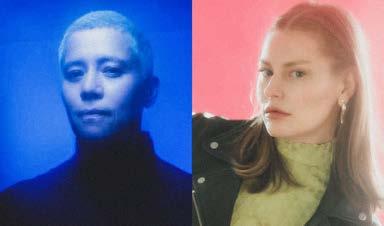
On the one hand, Jennifer Cardini, a veteran of Parisian nightlife and resident Rex Club, while exploring the experimental sounds of electronica at the avant-garde Le Pulp: futuristic genres, acid and narcotic cuts, over-saturated nu-disco... And from there to stardom, becoming a regular at clubs like Panorama Bar and Fabric, and directing the creative platforms and labels Correspondant and Dischi Autunno. On the other hand, Perel, alias of Annegret Fiedler. Producer, vocalist, DJ and tamer of synthpop and new wave sounds, she was the first German name to be released on James Murphy’s seminal label DFA Records, before establishing herself in the Berlin underground, and becoming a regular for labels like Permanent Vacation and Cardini’s Correspondant. Her cosmic disco basslines, techno synths and ghostly chants will join Cardini’s record collection in what promises to be a dreamy, hard-to-forget dawn.
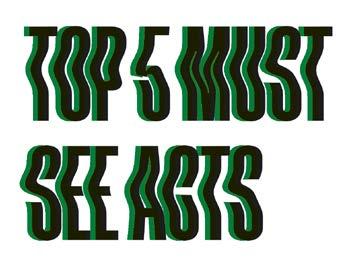
036 Report
SÓNAR’S BEEN ONE OF THE MOST LOVED AND RESPECTED EVENTS IN THE CALENDAR. A MEETING POINT FOR MUSIC FANS AND INDUSTRY HEADS ALIKE. HERE’S THE LIST OF THE ARTISTS YOU JUST CAN’T MISS THIS YEAR.
A restless member of the Barcelona underground, both solo and as half of the duo Shakti Alliance with Troya Modet.
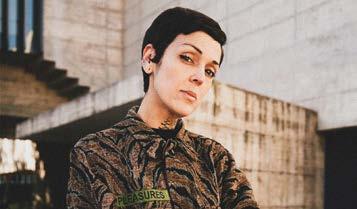
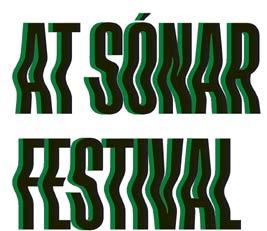
Virginie, also known as Vir, is one of the city’s most flexible and talented DJs, drawing on her vast record collectionshe’s been an avid record buyer since the 1990s, when she moved from Caracas to New York. The Venezuelan-born DJ is one of the most exploratory diggers in Barcelona, mixing up deep, pumping house with dusty soul, disco and music from around the world. Rather than pursuing perfection with her mixes, she prefers to improvise, taking risks and indulging her playful sense of eclecticism. At Sónar 2022, she’ll let her records shine, under the sun and on the dancefloor.
Not many DJ’s can span the wide expanse between synthwave and the relentless percussion of Berlin techno. But Avalon Emerson isn’t most DJ’s. Raised under the wide open skies of Arizona and cutting her teeth as a promoter in the Bay Area warehouse party scene of the late 2000s before moving to Berlin, hers is an eclectic but laser focused approach to djing that unlocks all the utopian potential of the dancefloor, one psychedelic bassline at a time.
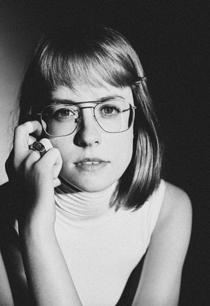
The German electronic supergroup return from a four-year hiatus to grace the stage at Sónar 2022. Sascha Ring (Apparat), Gernot Bronsert and Sebastian Szary (Modeselektor) should need no introduction for long-time Sónar attendees: the trio’s triumphant set in 2017 was an unforgettable moment. As it should have been, because their music is stadium sized in scope. Across three albums they re-imagined the fuzzy, bassled minimal sound of mid-2000s Berlin as enormous, world-conquering pop songs (the thundering hook from A New Error is surely one of that decade’s most irresistible earworms). And now they’re back with new music and a new live show, created again with long-time collaborators PFA Studios. Make no mistake, their performance is going to be a seriously memorable event.

037
Estamos comenzando la temporada 2022, una temporada que llevábamos esperando mucho tiempo, desde 2019. Antes de comenzar, cierra los ojos y... ¿Cómo te imaginas esta temporada 2022?
Si cierro los ojos, pensaría románticamente que empezamos donde terminamos. Básicamente, si continúa como antes de la pandemia, eso ya es un sueño hecho realidad.
Volviendo a estas dos temporadas que hemos “perdido” 2020 y 2021, ¿cómo recuerdas esos dos años?
Fueron unos primeros meses muy extraños, todo era muy incierto. El foco se centró en “¿qué está pasando?” Y luego de repente, cambió a “esto podría alargarse por algún tiempo”. Estaba tratando de no obsesionarme demasiado con lo que estaba sucediendo en el mundo, aunque obviamente era triste para todos, pero sentí que tenía que trabajar en mí mismo. Ser constructivo y productivo de una manera que sería beneficiosa para cuando todo esto terminará, y comenzará a tocar de nuevo y poder lanzar música.
En algunas de tus biografías se dice que a los 12 años querías tener tus propios Technics, ¿es verdad? ¿Quién te influenció en la música electrónica?
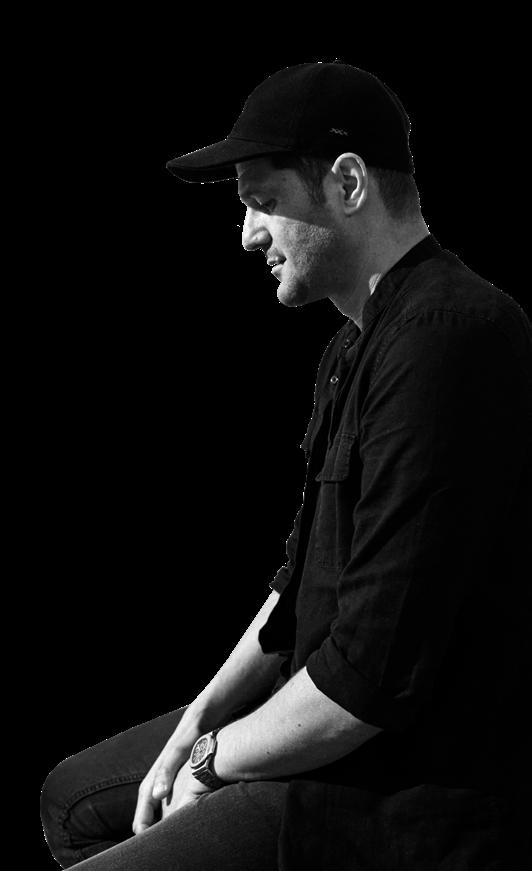
Sí, bueno mis abuelos tenían a mi tío a una edad más avanzada, entonces yo tengo un tío muy joven. Y cuando era niño, solíamos ir a visitar a mis abuelos y él siempre estaba sentado en el estudio produciendo trance y hard trance y Ambient y este tipo de música. Entonces, estaba sentado casi todos los domingos en un estudio con un amigo y todas esas máquinas. Me dio cintas con canciones muy raras, como, no sé si lo recuerdas, pero a mediados de los 90 había una canción que decía “Who the fuck is Elvis?” era una pista techno. La música electrónica era algo muy nuevo, porque en este momento estamos escuchando Wu Tang Clan y Nirvana. Así que él prácticamente me introdujo a la música, y luego tuve dos amigos en el pueblo donde crecí y me enseñaron a pinchar.
Ourind u s t r y i sn’tthepeac
We are starting this 2022 season that seems like it will finally be the one we wished for since 2019, now, before we start, close your eyes and... How do you imagine the 2022 season?
If I close my eyes, I would just romantically think we started where we ended. Basically, if it picks up the way it was pre pandemic, that’s already a dream come true.
So what was it like to live? Going through 2020 and 2021? How do you how do you remember those two years?
It was a very weird first few months, everything was very uncertain. The focus was on “what is going on?”, and then suddenly it shifted into “This could go on for some time”. I was mind shifting trying not to get too obsessed with what was happening in the world, even though it was obviously sad for everyone, but I felt I had to work on myself. Be constructive and productive in a way which would be beneficial for when everything would end, and I’d start to play gigs again and be able to release music.
038 Interview
My very first gig 28 years ago!

In some of your biographies, it says that at the age of 12, you wanted to have your own Technics, is this true?, why, who influenced you in electronic music?
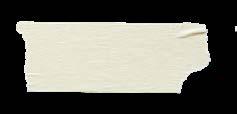

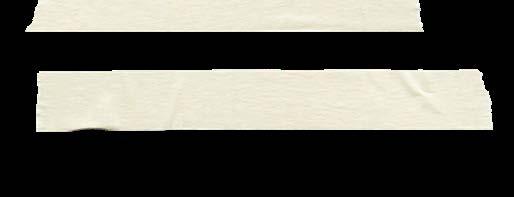
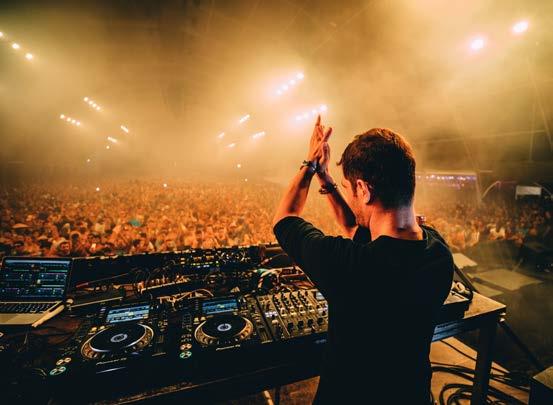

Yes, well my grandparents had my uncle at an older age, so I have a very young uncle. And when I was a kid, we used to go visit my grandparents and he was always sitting in the studio producing trance and hard trance and Ambient and this kind of music. So, I was sitting pretty much every
Sunday in a studio with a friend and all of those machines. He gave me tapes with very weird songs, like, I don’t know if you remember it, but mid 90s There was song that goes “Who the fuck is Elvis?” it was a techno track. Electronic music was something very new, because at this time we’re listening to Wu Tang Clan and Nirvana. So he pretty much introduced me to the music, and then I had like two old friends in the village where I grew up and they showed me how to DJ.
039
s .
ace and love i n d u s t r y t h a t e veryone ht i n k s i t i
A LO LARGO DE TU CARRERA, ¿QUIÉN DIRÍAS
He pasado por diferentes etapas de mi carrera. Diría que mi tío, por supuesto, al principio me introdujo a la música, luego mis amigos, Alex y Michelle. Me dieron la oportunidad de usar su equipo: tenían como un centro jóven, así que el miércoles por la tarde fuimos allí para mezclar y practicar con su equipo.
Y luego, por supuesto, gente que me encontré en el camino como Nic Fanciulli que me hizo lanzar en su sello y Luciano que me contrató para su sello Cadenza, donde pude trabajar con él. Luego fue Ushuaïa el que me dio la oportunidad de trabajar en nuestra propia fiesta como es ANTS.
Along your career, who would you say is helped make your dream come true?
I went through different stages of my career and I would say my uncle of course, in the beginning to introduce me to music, then my friends, Alex and Michelle. They gave me the opportunity to use their equipment - they had like a youth centre, so Wednesday afternoon, we went there to mix and practice on their gear.
And then of course people along the way, people like Nic Fanciulli who made me release on their label and Luciano signed me to his label ‘Cadenza’, and I was able to work with him. Later on, it was the Ushuaia that gave me the opportunity to work on our own party like ANTS.
QUE HA AYUDADO A HACER REALIDAD TU SUEÑO?
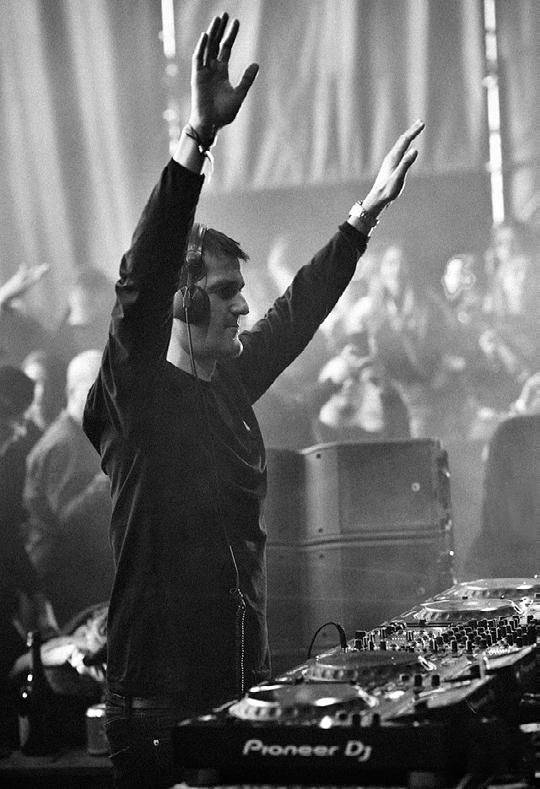
040 Interview
How’s the scene in Switzerland these days?
The scene is incredible in Switzerland. Zurich for example, had at one point more clubs in one city than any other big city, we had a crazy amount of clubs. We had electronic music not only Saturdays, Fridays and Thursdays, but clubs where you literally could party from Thursday till Monday night.
We also have the street Parade, which is the heart of electronic music in Switzerland, with around 1 million people, and that’s all electronic music, it’s house and techno. So, Switzerland has a very big scene nowadays, it’s incredible how many clubs we have which programme electronic music on a weekly basis. It’s not just locations which do
any kind of music and once in a while you have house or techno, it’s international artists every week and not only one, but maybe like five, six a week.

When and how was your first time in Ibiza? What kind of year was it? And what do you remember?

My first time the Ibiza was 2004 and it was also my first gig at Space. But at this time for me it was the biggest dream ever. 2004 right after I had maybe my first, second or third release out, and I met the people who were in charge of “In Bed With Space” at Space, which was basically the after party of Carl Cox’s night was ‘In Bed With Space’ Wednesday morning. And I played with them in Switzerland and they booked me straightaway for Ibiza.
¿Cómo es la escena en tu Suiza?
¡La escena es increíble! Zúrich por ejemplo, tuvo en un momento más clubes que en cualquier otra gran ciudad. Teníamos música electrónica no solo los jueves, viernes y sábados, sino también clubes donde literalmente podías divertirte desde el jueves hasta el lunes por la noche.
También tenemos el Street Parade, que es el corazón de la música electrónica en Suiza, con alrededor de un millón de personas, y eso es todo música electrónica. Suiza tiene una escena muy grande hoy en día, es increíble la cantidad de clubes que tenemos que programan música electrónica semanalmente. No son solo lugares que hacen cualquier tipo de música y de vez en cuando tienes house o techno, son clubs 100% con artistas internacionales cada semana y no solo uno, sino tal vez como cinco o seis por semana.
¿Cuándo y cómo fue tu primera vez en Ibiza? ¿Qué año fue? ¿Qué recuerdas?
Mi primera vez en Ibiza fue en 2004 y también fue mi primera actuación en Space. En ese momento para mí era el sueño más grande de mi vida. En 2004, después de haber publicado quizás mi primer, segundo o tercer lanzamiento, y conocí a las personas que estaban a cargo de “In Bed With Space” en Space, que era básicamente la fiesta posterior a la noche de Carl Cox, miércoles por la mañana. Y toqué con ellos en Suiza y enseguida me contrataron para Ibiza.
UNA DE LAS FIESTAS DE ANDREA ES ANTS, ¿QUÉ HA SIGNIFICADO ANTS EN TU VIDA?

ANTS fue una bendición porque tuve la oportunidad de tocar en Ibiza con Cadenza. Luciano me contrató mucho en Ibiza, había muchas fiestas, Luciano and Friends con Cadenza.

Tuve el gran apoyo de Ushuaïa, y querían construir la marca y hacer crecer mi nombre como marca. Claro, en aquel momento mi nombre era demasiado pequeño para generar casi cualquier cosa en la isla. Teníamos esta idea de construir una marca y tenerme como residente y crecer juntos y básicamente tener la marca para apoyar mi carrera, pero luego también para construir mi carrera en un cierto punto donde la marca se beneficiaría también de un perfil artístico y viceversa Y creo que ahora estamos en este punto. ANTS fue prácticamente el cambio en mi carrera más importante. Porque también era una apuesta.


041
Always good vibes with Carlito! @Carlcoxofficial
zúrich.
Reunited with @marcocarola

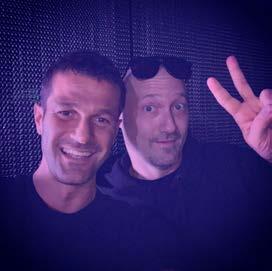

PAUL!
Si tienes que recordar un momento especial, una noche de verano... ¿De cuál te acuerdas?
Es difícil, por ejemplo, mis padres me vieron por primera como DJ en Ushuaïa en el escenario principal frente a una multitud. Así que ese fue un momento bastante especial, porque vi lo orgullosos que estaban mis padres de mi. Aparte, todas las noches de éxito que tuvimos, como que nuestra primera intención era que ANTS solo fuera en la cabina pequeña, y la segunda fiesta, ya teníamos que abrir el escenario grande. Así que eso también fue algo muy especial, por la retroalimentación y el seguimiento. ¡Una locura todo!
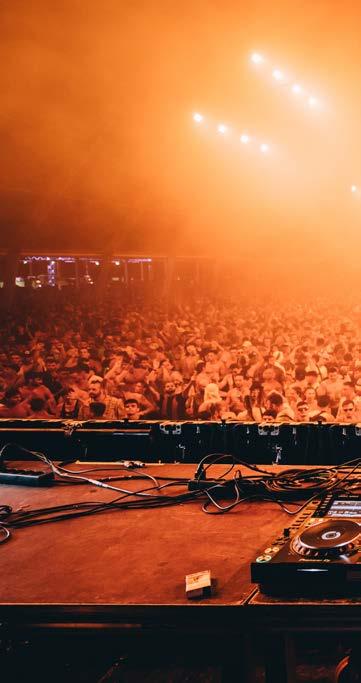
¿Cuál ha sido una decisión difícil que tuviste que tomar en Ibiza?
La decisión más difícil fue la de ser realista. Tenía 12 años cuando comencé, y tal vez 15, 16 años después, estaba en un punto en el que vi cuánto era posible, vi cuánto se puede lograr. Y sabía cuánto estaba dispuesto a dar por esto. Sabía que tenía que construir cosas que estuvieran apegadas a mi filosofía y a la forma en la que veo mi futuro. Entonces, obviamente, para un artista, quieres tener tu propia fiesta, quieres tener tu propio sello, quieres tener tu propia identidad.

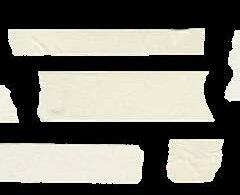

042 Interview
@IAMPAULKALKBRENNER
With my brother nathi aka @realblackcoffee! — en Ibiza, Spain.
Estar atrapado en un entorno que quizás te dio mucho al principio. Pero una vez que se construyó, tienes que tomar esas decisiones. La decisión más importante que tuve que tomar estaba ligada a grandes riesgos, porque era como si fracasara o si tuviera éxito. Fue el punto en el que tuve que decir: “Está bien, es posible que tenga que dejar Cadenza y construir mi propio camino”.
Es un decisión en la que sabes que todo se retrasará durante algunos años tal vez, pero luego la recompensa será cada vez mayor para el sueño que deseas lograr.
If you have to remember a special moment, a summer night... Which one do you remember?
It’s difficult. I had for example, my parents seeing me for the first time DJ’ing at Ushuaia on the mainstage in front of a sold out crowd. So that was a pretty special moment, because I saw how proud my parents were.
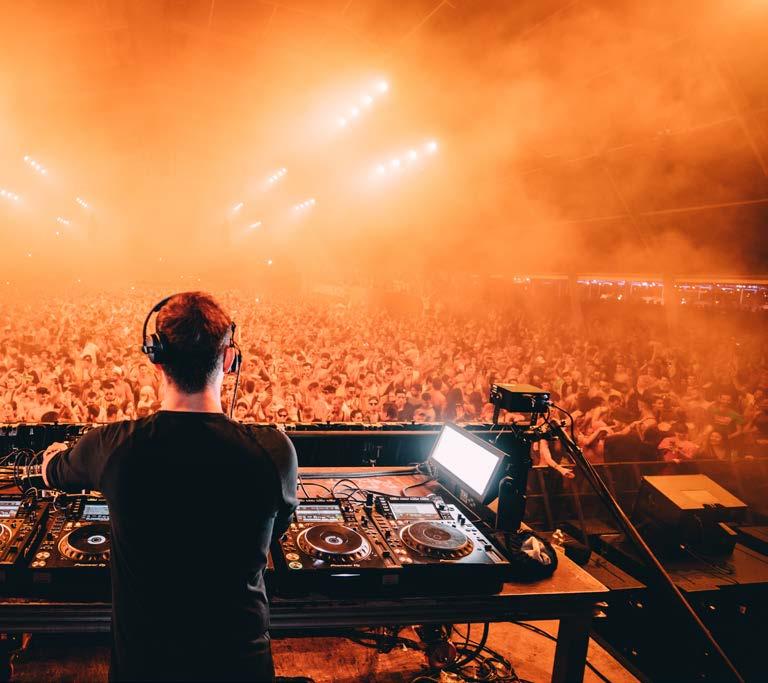
Apart from all the successful nights we had, like our first intention was having Ants just playing in the small room, in the back of Ushuaia, and the second party, we already had to open the big stage. So that was
One of Andrea’s parties is ANTS, what has ANTS meant in your life?
ANTS was a blessing because I had the opportunity to play Ibiza with Cadenza. And then to Luciano booked me a lot in Ibiza, there were many parties, Luciano and friends with Cadenza.
I had the very big support from Ushuaia, and they wanted to build a brand and build my name and have a little bit of a face to the brand. And then of course, my name was too small to generate pretty much anything on the island. We had this idea of building a brand and having me as a resident and grow together and basically have the brand to support my career, but then also to build my career at a certain point where the brand would take advantage also from a profile and vice versa. And I think now we are at this point and Ants was pretty much the heaviest career change I had. Because it was also a bet. I believed in Ants, and I saw the potential and Ants, but I knew if Ushuaia was gonna put me on the spot, I have to release a lot of tracks, I have to release on solid labels, and I have to do my part as well.
also something which was very special, because the feedback and the following. Everything was insane.
What has been a difficult decision you had to make in Ibiza?
The most difficult decision was being realistic. I was 12, when I started, and maybe 15, 16 years later, I was at a point where I saw how much was possible, I saw how much you can achieve. And I knew how much I was willing to give for this. I knew I had to build things which were attached to my philosophy, and to the way I see my future. So obviously, for an artist you
want to have your own party, you want to have your own label, you want to have your own identity.
Being stuck in an environment which maybe gave you so much in the beginning. But once your profile was built, you had to make those decisions. My biggest decision I had to make which was attached to big risks, because it was like, failing or success - It was the point where I had to say, “okay, I may have to leave Cadenza and build my own thing”. It’s a decision where you know it’s going to put you back for a few years maybe, but then the payoff is going to be bigger and bigger to the dream you want to achieve.
043
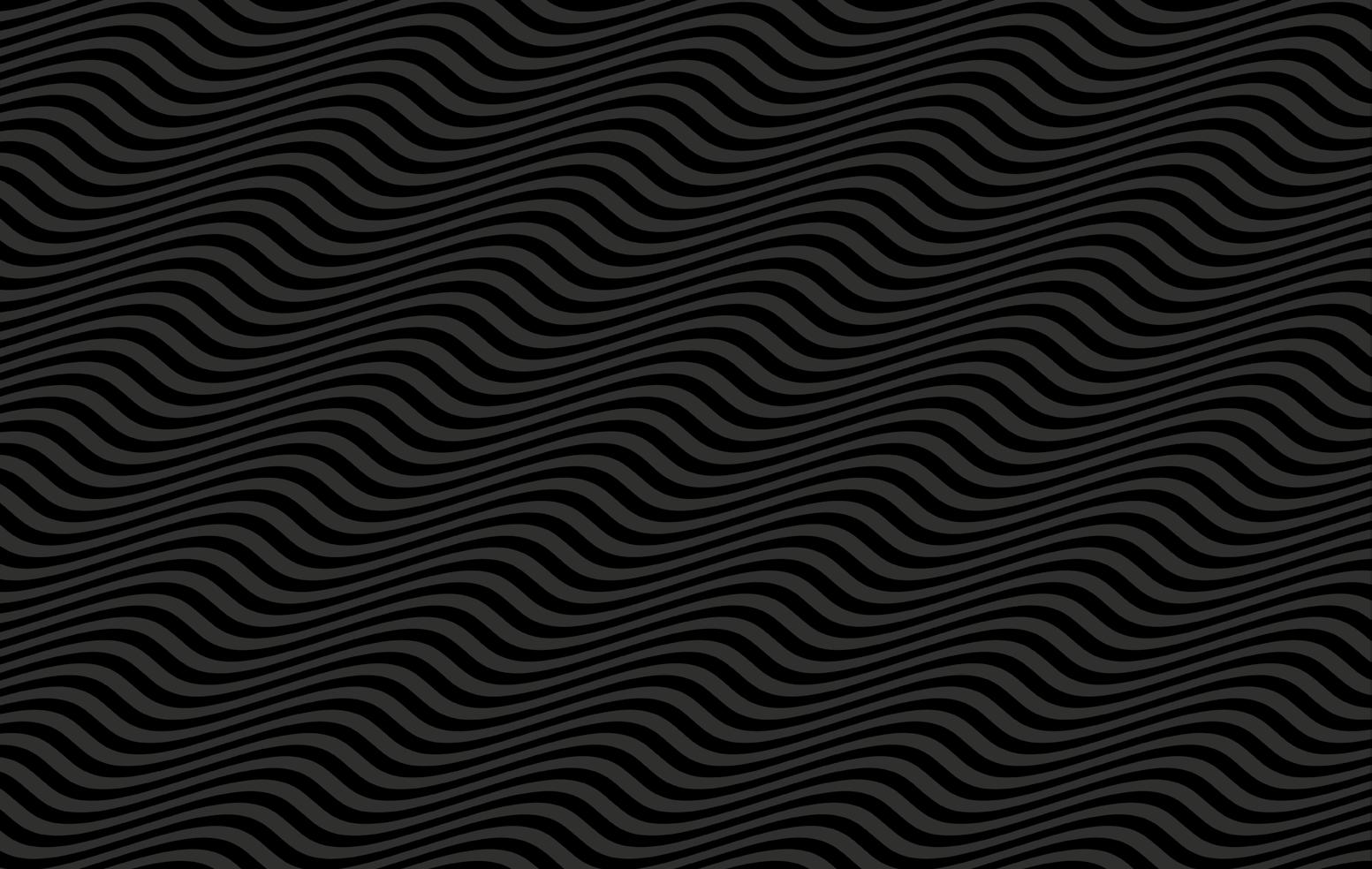
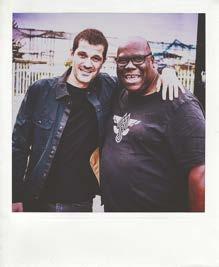
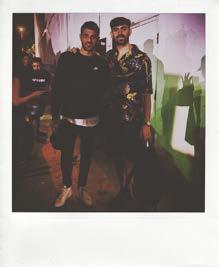

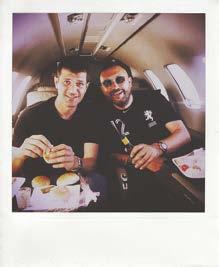
044

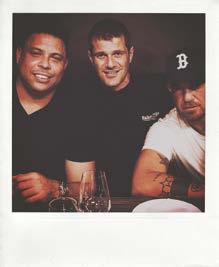
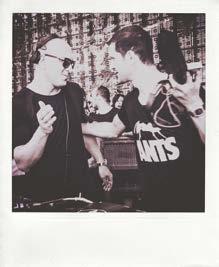
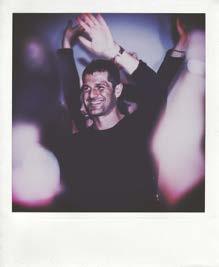
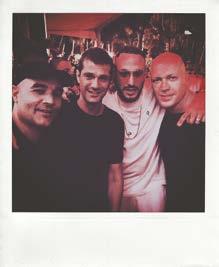

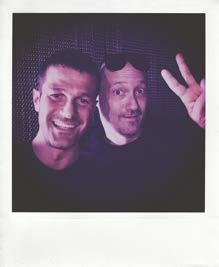
045
IBIZA
¿Qué odias de Ibiza y de la industria?
Las cosas han cambiado en mi carrera, y cuanto más grande es tu perfil, más presión sientes cuando actúas en Ibiza, especialmente cuando se trata del punto en el que eres el centro de atención. Tienes que entregar más y más y más. Y cuando estás en el centro de atención, te atacan desde ángulos de 360°. Obviamente, nuestra industria no es la industria de la paz y el amor que todo el mundo cree que es. Ibiza es muy competitiva. Lo que hago esta basado en la música, la libertad y la diversión.
Luego hay otras cosas que detesto, lo caro Ibiza que es IBIZA. Desafortunadamente, Ibiza no es accesible para todos, como solía ser. Ibiza está en el mapa del mundo, y eres relevante en el mundo cuando tienes algo muy exitoso en Ibiza, y puede que no seas tan relevante si no estás en ese círculo de Ibiza. Al fin y al cabo, Ibiza tiene muchas más ventajas que inconvenientes, sigue siendo mi paraíso.
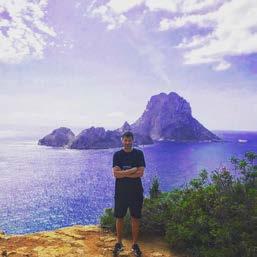
Things have changed in my career, and the bigger your profile becomes, the more you feel an overall pressure when you perform in Ibiza, especially when it comes to the point you’re in the spotlight. You have to deliver when you’re in the spotlight. And when you’re in the spotlight, you get attacked by from 360 angles. Obviously, our industry is not the peace and love industry that everybody thinks it is. Ibiza is very competitive. And even though what I do should be based on music, freedom, fun and everything.
Then there are other things I hate, which comes to Ibiza being very expensive. Ibiza is unfortunately not accessible to everyone, which it used to be. Ibiza is on the map of the world, and you’re relevant in the world when you have something very successful in Ibiza, and you may be not that relevant if you’re not in that Ibiza circle. At the end of the day Ibiza has so many more pros than cons, it’s still my paradise.
Here may appear one of your new projects, All I Need, what are you working on?




With All I Need we are working on a lot of music. Now we are with release four, so we are very young, but I already had so many satisfactions, a lot of media coverage. I could get the attention I wished for, I had people on the label so far like Deetron and Kevin Saunderson, who are my idols, people I really look up to. We have so many more releases scheduled.
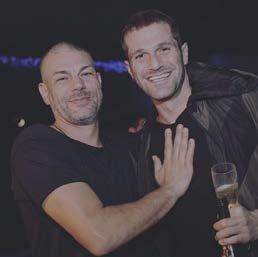
From the event side, we are scheduling some events, and we are doing some own productions in off locations. It’s really a work in progress, but you see results, and this is what makes me even more hungry and more motivated. All I Need right now is something in the making.

046 Interview
Música, arte y moda. ¿Crees que son un siguiente paso? ¿Es el camino a seguir?
Creo que podemos ir más allá adaptando ciertas tecnologías, siendo también un poco más independientes en las industrias de la música, donde básicamente solo las grandes discográficas y las grandes firmas tienen algo que decir. Creo que estamos en un momento muy revolucionario en el mundo, no solo en la industria de la música, y se puedes adaptar ciertas tecnologías en la forma de lanzar tu música.
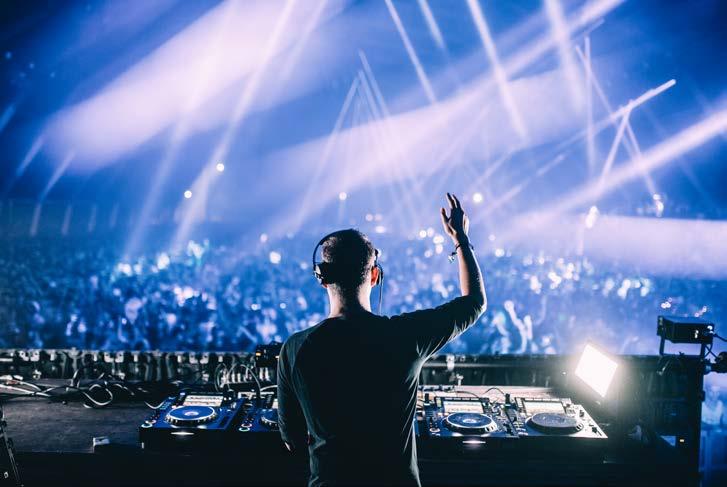
Mi objetivo es volverme un poco más independiente, donde no veas solo el 0,04 % de los ingresos para ti, sino que tal vez también tengas como el 80 % de los ingresos, que luego puedes poner a trabajar para diferentes proyectos, lo cual va para hacer tu marca más grande. Así que creo que, desde el punto de vista comercial, podemos aprender un poco más en nuestra industria, como una industria independiente. Por lo tanto, creo que las colaboraciones con la moda, con el arte, con la tecnología con las innovaciones, son muy útiles.
Aquí aparece uno de tus nuevos proyectos, All I Need, ¿en qué estás trabajando?

Con All I Need estamos trabajando en mucha música. Ahora estamos con el lanzamiento numero cuatro. Somos muy jóvenes, pero tenemos muchas satisfacciones, mucha cobertura mediática. Ahora pude obtener la atención que deseaba, tener gente en el sello como Deetron y Kevin Saunderson, que son mis ídolos, gente a la que realmente admiro. Tenemos muchos más lanzamientos programados. Desde el lado de los eventos, estamos programando algunos eventos y estamos haciendo algunas producciones propias en otras locaciones. Realmente es un trabajo en progreso, pero se ven resultados, y esto es lo que me da aún más hambre y más motivación. Todo lo que necesito en este momento, se encuentra de camino.
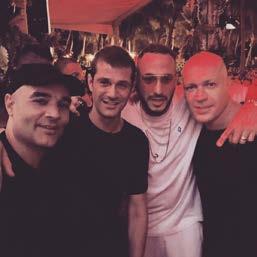
Music, art and fashion. Do you think there’s a next step? Do you think there’s something some somewhere further we can go?

I think we can go further by adapting certain technologies, by also being a bit more independent in the music industries, where basically only the major labels, and like major firms have something to say. I think we are in a very revolutionary time in the world, not only music industry, and if you can adapt certain technologies, if you can adapt certain new innovations in tech, in the way of releasing your music.
My goal is to go a little bit more independent, where you don’t see only 0.04% of revenue for yourself, but maybe also having like maybe 80% of revenue, which you can then put into work for different projects, which is going to make your brand bigger. So I think business wise, we can learn a little bit more in our industry, like an independent industry. Therefore, I think collaborations with fashion, with art, with technology with innovations, is very helpful.
047
What about this line up? — whit Nitesh Peshwani.
Como sello, All I Need, Cala Bass es uno de vuestros últimos lanzamientos. ¿Por qué este nombre? ¿Qué se puede escuchar aquí?
Porque todas las playas de Ibiza se llaman Cala, y el Bass es el elemento más potente de nuestras pistas de club. Así que viendo que se acercaba la temporada de Ibiza, combiné las palabras de una manera divertida, es un nombre espontáneo.
¿Cuándo trabajas en el estudio? ¿Qué horario, día de la semana? ¿Temporada?
Durante la pandemia fue casi todos los días, lo cual fue increíble. Porque como productor es una evolución constante, y cada día aprendes más y más. Fue genial pasar tanto tiempo en el estudio. Ahora, por lo general, cuando estoy de gira, hay como 3 meses en el período de verano en los que no voy al estudio en absoluto. Tal vez solo unas pocas veces. Cuando no estoy de gira, trato de ir al estudio tanto como sea posible, tal vez. Como 2 ó 3 noches por semana.
Conoces bien la industria musical, ¿alguna predicción para 2022?
Viendo la situación actual con el mundo, la guerra y todo. Acabamos de salir casi de una pandemia y luego tenemos otra cosa aún más triste que es una guerra. Obviamente, hay guerras constantemente en todo el mundo, que no se pueden olvidar, pero esto es algo que golpea muy fuerte.
Viendo la situación actual en el mundo, para mí personalmente esuna gran decepción, porque todos los días estoy deseando que todo se abra de nuevo, mi agenda está llena, pero también es una sensación muy extraña estar feliz por algo mientras hay tanta gente luchando de maneras que ni siquiera puedo imaginar. Tengo sentimientos encontrados cuando trato de imaginar la temporada en Ibiza ahora, obviamente espero que llegue a la paz y se encuentren soluciones y que podamos tener un verano de amor.
As a label, All I Need, Cala Bass is one of your latest releases. Why this name? What can be heard here?


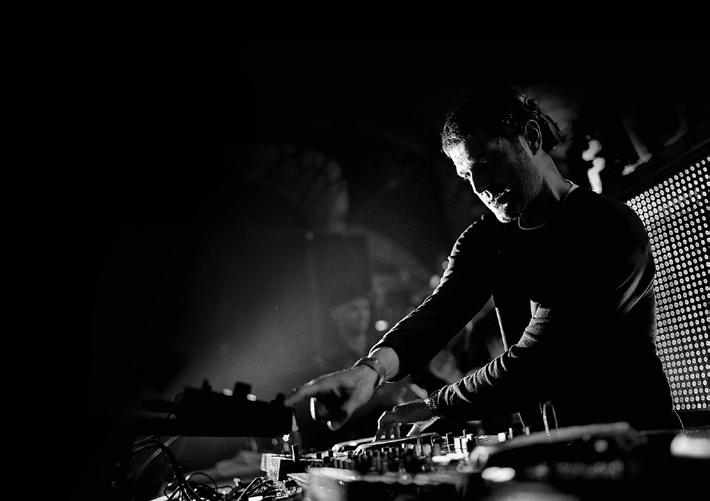
Because all the beaches in Ibiza are called Cala, and Bass is the most powerful element in our club tracks. So seeing the Ibiza season come closer, I combined the words in a funny way, it’s a spontaneous name.
When you work in the studio? What hours, day of the week? season? are your favourites?
During the pandemic it was almost every day, which was incredible. Because as a producer it is constant evolution, and you learn more and more every day. That was supercool spending so much time in the studio. Now usually when I’m on tour there is like 3 months in the summer period where I don’t go to the studio at all. Maybe only a few times. When I’m not touring, I try to go to the studio as much as possible, maybe. Like 2, 3 nights per week.
You know the Industry music well, Any predictions for 2022?
Seeing the current situation with the world, the war and everything. We just came almost out of a pandemic and then we have another even sadder thing coming which is a war. Obviously, there is war constantly all around the world, which couldn’t be forgotten, but this is something that hits super hard.
So seeing the current situation in the world, it’s for me personally it’s a big downer, because every day I’m pretty much looking forward to everything opening again, my agenda is full, but it’s also a very strange feeling being happy for something whilst there are so many people struggling in ways I can’t even imagine. I have mixed feelings when I try to picture the season in Ibiza now, obviously I hope that everything will come to peace and they will find a solution and that we can have a summer of love.
048 Interview



MËISTER_
Un evento social donde juntarse con amigos y compartir la pasión por el sonido analógico.
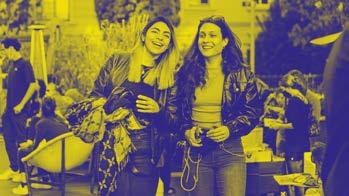
DAVE HANG_
Es una reunión de amigos, compañeros, melómanos, y apasionados por la música. En donde preservamos y fomentamos algo tan bonito e importante como la música en formato analógico con toda su esencia y disfrutamos de ella.
LUIS SURIA_
Un evento sociocultural donde el formato musical del vinilo es el único protagonista.
SONOTONE_
Para mí Hola Sundays es mi casa, el punto de encuentro perfecto para disfrutar con amigos! encontrar a djs y productores de la isla en pleno relax invernal, en verano siempre se corre y no hay tiempo para nada. Hola Sundays conecta todo esto.
RUBÉN SOLAR
Más que música.
NOELIA MÉNDEZ
Pues no es un domingo cualquiera.
JORDAN_
Un proyecto sociocultural enfocado a la música electrónica.
ESCRIVÁ_
Hola Sundays es solidaridad, buena música y forjar comunidad.
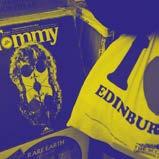
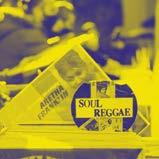
MIGUEL GARJI_
Un concepto de Domingo musical y mercado de vinilo, donde además de vender y comprar este maravilloso y auténtico formato, puedes disfrutar del sonido en directo de artistas relacionados con el mundo del acetato surcado, tomar algo y compartir sensaciones con colegas del sector, y por supuesto BAILAR.
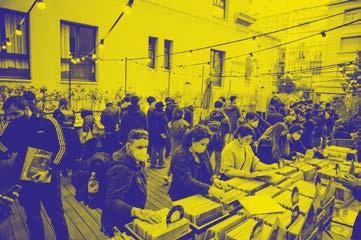

RICHI CUTANDA
Pasión y dedicación por la música.
050 Report

ALEX KENTUCKY_
Un domingo diferente, un punto de encuentro para amigos y para la industria de la música, vinilos muchos vinilos, con una fantástica organización y siempre muy buen rollo en las diferentes localizaciones en que se realiza, altamente recomendable.
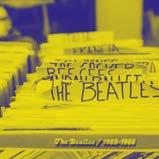

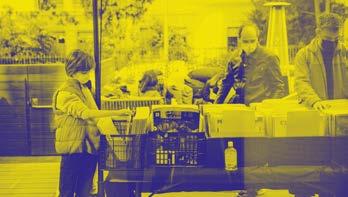
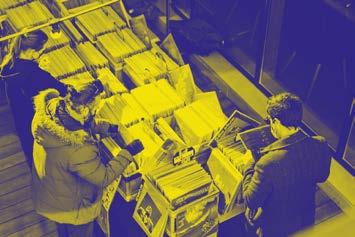
JORDI CARRERAS_
El encuentro orgánico que aporta valor a la industria actual de la electrónica nacional.
ARSENE_ Hola Sundays es amor al vinilo y a la música.
TONI CLEMENTE_
Un buen aporte musical para Ibiza.
HOSSE_
El punto de encuentro de artistas, gente del sector y music lovers, donde compartir buenos momentos, charlas y debates musicales enriquecedores.
RAYKO SANTOS_
Hola sundays! Es recuperar esa sensación de rebuscar en las cubetas con vinilos que tanto añoramos y encima rodeado de buena música, amigos y buen rollo.
DANI_
Una gran reunión de amigos para poder disfrutar de un rato agradable.
LUCA AVERNA_
Es el punto de encuentro del domingo de invierno en Ibiza. Un evento donde puedes encontrar a djs y productores de la isla en pleno relax invernal . Hola Sundays es el evento que conecta toda la música de la isla.
052 Report
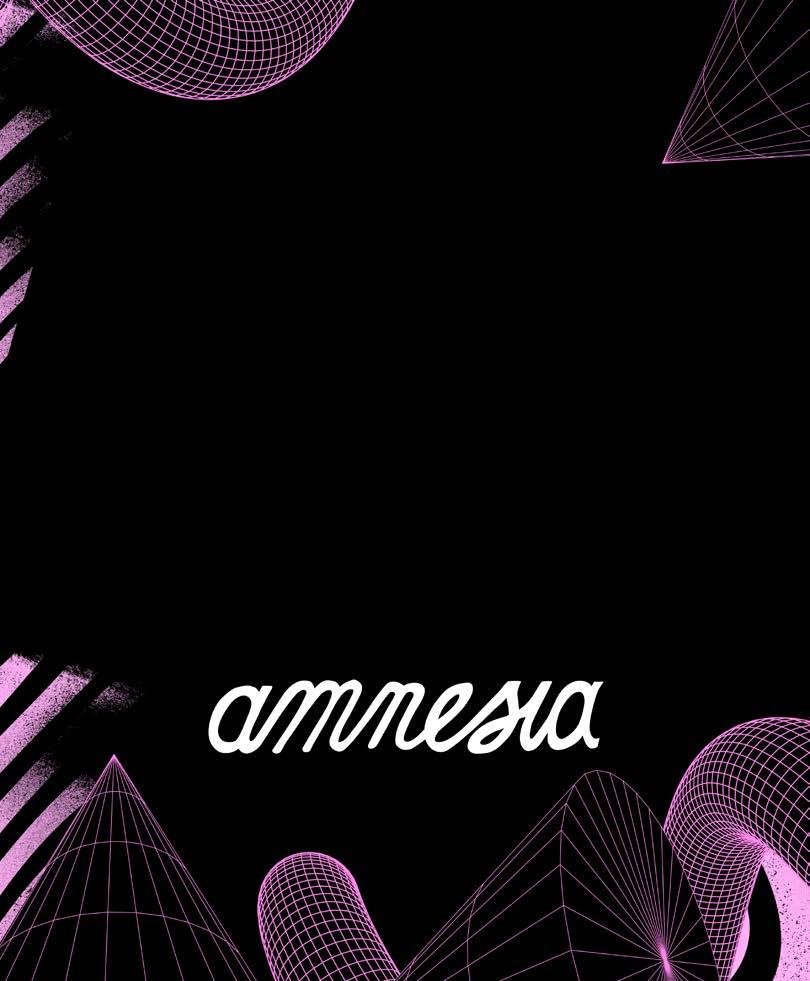

CARMEN VIDAL
Guionista, directora y productora.
Este Ibicenca de origen es ganadora de diez NY Emmys Awards®, un Student Academy Award® (Oscar para estudiantes) y un Telly Award. Guionista, directora y productora de televisión española-americana, sus proyectos han sido exhibidos en festivales internacionales, el Museo de Arte Moderno de Nueva York, PBS, la ONU, LeMonde.fr y la cadena de televisión ARTE.

054 Interview
by Silvia Aparicio
Eres de Ibiza pero desde hace más de una década vives en New York, ¿crees que hay similitudes entre Ibiza y New York?
Tanto la una como la otra son imán de atraer a personas muy diferentes, con unos backgrounds y unas historias muy diferentes, que suelen viajar mucho y pasar temporadas en otros lugares y esto provoca un interés de acoger personas de todo tipo. Los dos espacios permiten experimentar, Ibiza está más centrada en el turismo pero creo que hay mucho espacio para jugar y experimentar, de una forma lúdica, de forma original y creo que también le pasa a New York, nuevos negocios, tiendas, restaurantes... Formas de hacer cosas que en otros sitios no las encuentras. Además, ambos lugares son muy tolerantes y dan sensación de libertad.
¿Qué echas de menos de New York cuando estás en Ibiza y que echas de menos de Ibiza cuando estás en New York?
Cuando estoy en New York echo de menos la calma, la tranquilidad, la naturaleza de Ibiza. Y cuando estoy en Ibiza echo de menos la actividad, la velocidad y la parte urbana, dinámica y cosmopolita de la ciudad.
¿Sientes que has tenido que demostrar el doble por ser mujer en una industria tan de hombres?
Creo que es una industria, en general, complicada para todos porque no hay un camino claro de los pasos a dar. Para todo el mundo hay una parte de búsqueda, de encontrar tu voz y tu individualidad para contar historias. En mi caso, ser mujer es parte de mí, de mi identidad y condicionan las cosas que me interesan, entonces, de forma natural, me asocio con otras mujeres para documentales y otros trabajos. Es verdad que, a veces, estoy en un festival y me doy cuenta que soy la única mujer pero también es verdad que ha cambiado mucho. Desde hace 20 años que empecé hasta ahora, sí se nota que hay más presencia de mujeres. Sí ha habido un ejercicio de reflexión sobre qué puedo aportar yo, por mi edad, mi sexo, mis intereses, mi identidad, mis valores y mi experiencia. Al final es parte de mi subjetividad.
You are from Ibiza, but you have been living in New York for more than a decade; do you think there are similarities between Ibiza and New York?
Both the one and the other are magnets for attracting very different people, with very different backgrounds and stories, who tend to travel a lot and spend time in other places, and this arouses an interest in welcoming people of all kinds. The two spaces allow you to experiment, Ibiza is more focused on tourism, but I think there is a lot of room to play and experiment, in a playful way, in an original way and I think it also happens to New York, with new businesses, shops, restaurants... Ways to do things that you can’t find anywhere else. In addition, both places are very tolerant and give a feeling of freedom.
What do you miss about New York when you are in Ibiza and what do you miss about Ibiza when you are in New York?
When I’m in New York, I miss the calm, the tranquillity, the nature of Ibiza. And when I’m in Ibiza, I miss the activity, the speed, and the urban, dynamic and cosmopolitan aspect of the city.
Do you feel that you have had to prove twice as much for being a woman in such a men’s industry?
I think that, in general, it is a complicated industry for everyone because there is no clear path to follow or the steps to take. For everyone, there is a part of searching, of finding your voice and your individuality to tell stories. In my case, being a woman is part of me, of my identity and that conditions the things that interest me, so, naturally, I associate myself with other women for documentaries and other works. It is true that sometimes I am at a festival, and I realise that I am the only woman, but it is also true that a lot has changed. Since I started 20 years ago until now, it is noticeable that there is a much greater presence of women. Yes, it has led me to reflect on what I can contribute, due to my age, my gender, my interests, my identity, my values, and my experience. In the end, it is part of my subjectivity.
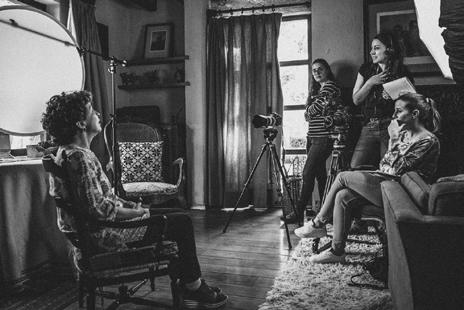
055
Rodaje - Photo: Jorge Láinez Juan
¿Por qué crees que hay tan pocas mujeres en la industria?
Hay mujeres en la industria pero diría que en menos puestos de poder. En general hay menos directoras mujeres y menos directoras de fotografía pero por ejemplo los últimos 5 Goyas a director novel han sido para mujeres. Lo dicho, claramente está cambiando, es algo más general de la sociedad europea, en los puestos de poder hay más hombres aunque eso, cada vez más mujeres encuentran su lugar como directoras, productoras, editoras.
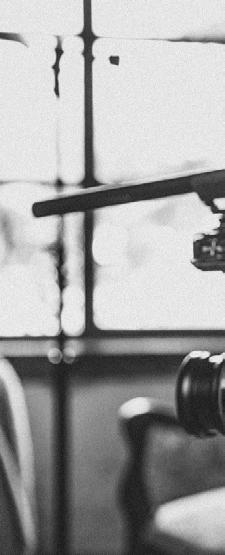
¿En qué te ha ayudado ser mujer y en qué te ha perjudicado?
Me ha ayudado a que haya una fluidez en los temas que tomo, en los temas que me interesan. Por ejemplo, me fui a Tanzania a trabajar sobre el acceso a la tierra de las mujeres en la tribu Kura y lo que teníamos en común con ellas es que éramos mujeres, hablaron con nosotras por nuestra condición de mujeres, esto hizo que se abrieran y compartieran sus historias. El tipo de historias que yo busco, me facilita el acceso por ser mujer.
Hablamos de tu cortometraje 6 am. ¿Cómo surgió la idea? ¿Por qué Sigur Ros?
Es un corto que hice cuando llevaba un año en N.Y. y la idea surgió porque me apabullaba la ciudad. La llegada fue más dura de lo que yo había anticipado y buscaba humanizar la ciudad, enseñar su belleza y de hecho hay mucho mar y agua en el corto, es una historia de luz y espacio, en esa hora mágica del amanecer. Era el momento de enamorarme de la ciudad, para mí no era tanto los rascacielos o los taxis amarillos, era encontrar un momento de calma en una ciudad tan dinámica y cansada.
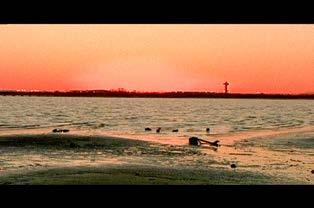
La música también fue un proceso encontrarla, ya conocía a Sigur Ros y este grupo permite el uso de su música para proyectos no comerciales. Es hipnótica, tiene un crescendo pero que avanza de una forma que funciona para unir las diferentes localizaciones y el cambio de oscuridad a la luz del sol, me ayudaba cohesionar la historia.
Este corto, hemos leído, simboliza las posibilidades antes un nuevo día, ¿qué posibilidades se abrieron con él para ti?
Es un corto muy importante en mi carrera porque fue el primer corto que ganó el Oscar de mi Universidad, fui la primera española que ganó este Oscar y en seguida me salió un trabajo. Estos premios ayudan a filtrar y hace que la gente te observe y te escuche entre tanta gente que hace cortos. A pesar de que yo solo tenía experiencia como estudiante y algunas participaciones, me ayudó a tener un trabajo y te da visibilidad para que se te considere. Debo decir que hacer solo un buen corto no sirve, hay que seguir trabajando y no garantiza nada, pero es un buen principio. A nivel personal, me hizo plantearme: al final, a lo mejor me puedo ganar la vida con esto. Me dio seguridad y que tal vez el sueño de hacer pelis era posible.
Why do you think there are so few women in the industry?
There are women in the industry, but I would say in fewer positions of power. In general, there are fewer female directors and fewer directors of photography, but for example, the last five Goya awards for new directors have gone to women. Having said that, it is clearly changing. It is something that’s more general in European society, in positions of power there are more men, although there are more and more women finding their place as directors, producers, editors…
How has being a woman helped you and how has it been detrimental to you?
It has helped me to have a fluidity in the subjects that I take, in the subjects that interest me. For example, I went to Tanzania to work on access to land for women in the Kura tribe, and what we had in common with them is that we were women, which meant they talked to us because of our status as women; it made them open up and share their stories. Being a woman gives me access to the type of stories that I am looking for.
056
Fotograma 6 am de la película
Let’s talk about your short film, 6 am. How did the idea come about?
Why Sigur Ros?
It’s a short film I made when he had been in NY for a year. and the idea came about because I was overwhelmed by the city. The arrival was harder than I had anticipated, and so I sought to humanize the city, show its beauty and, in fact, there is a lot of sea and water in the short film; it is a story of light and space, at that magical hour of dawn. It was time to fall in love with the city; for me, it wasn’t so much the skyscrapers or the yellow taxis, it was finding a moment of calm in such a dynamic and exhausting city.
Finding music was also a process, I already knew Sigur Ros, and this group allows the use of their music for noncommercial projects. It’s hypnotic, it has a crescendo, but it progresses in a way that works to bring the different locations together and the change from darkness to sunlight helped me to make a cohesive story.
We have read that this short film symbolizes the possibilities presented by a new day. What possibilities did it open up for you?
It is a very important short film in my career because it was the first short that won the Oscar at my University, I was the first Spanish person to win
this Oscar and I immediately got a job... These awards help filter and make people watch and listen to you among all the other people who make short films. Despite the fact that I only had experience as a student and had taken part in some things, it helped me get a job and raised my public profile so that people could take account of me. I must say that just making one good short film is not enough; you have to keep working and it doesn’t guarantee anything, it’s just a good start. On a personal level, it made me wonder whether, in the long run, I could maybe make a living from this. It gave me security and made me think that maybe the dream of making movies was possible.

057
Carmen y cámara -
Photo: Jorge Láinez Juan
Tu trabajo tiene muchos tintes sociales y reivindicativos… ¿Crees que tener un trabajo que mucha gente ve, conlleva responsabilidades sobre qué cuentas y cómo?
Sí, porque lo que no se cuenta, no existe. Las historias que contamos son una semilla para el cambio y para llegar a mucha gente. Puedes hacerlo desde la conexión, desde lo que nos une o contar desde lo que nos separa, desde lo sensacionalista o histriónico. He pensado mucho en ¿quién soy yo para contar ciertas historias? Y sí, me gusta hacerlo con honestidad, con empatía y creando un espacio donde podemos vernos reflejados, desde nuestra humanidad. Me parece que nuestro trabajo es muy potente, muchas veces lo que vemos en la tele, series... Nos hace conectar con personas que, en un principio, no tienen nada que ver con uno mismo o interiorizamos lo que está “bien” o “mal” o “normal”. Así que sí, es importante elegir qué cuentas y pensar cómo lo cuentas.
De entre tus múltiples e importantes premios como más de 10 Emmys o el Student Academy Awards, ¿de cuál te sientes más orgullosa?
Estoy muy contenta de estos reconocimientos aunque ganar nunca ha sido el objetivo. Me gusta mi trabajo y su proceso. Siempre es una alegría pero no es lo que persigo. Del que me siento más orgullosa es del Oscar de estudiantes, porque el corto lo hice sin ninguna expectativa, libre, lo pasé muy bien haciéndolo y es obvio que no lo esperaba, estaba aún en clase, soy de Ibiza pero mis profesores lo seleccionaron y, cuando gané, fue una sorpresa total. Y luego fue muy divertido, me llevaron a Los Ángeles, un súper hotel, vino mi familia, me llevaron a la gala, cóctel... No sé, fue algo que hice yo sola, muy interno, un proceso muy bonito y sí, me siento orgullosa de que ganara un corto de la Universidad Pública de N.Y. aún sin contactos. Me marcó mucho, me trae muy buenos recuerdos y me hizo ver que las cosas son posibles.
De todas tus facetas profesionales como directora, guionista, productora, cuál te gusta más?
Se alimentan unas de otras y cada una tiene cosas que me gustan. Escribir, sola, en casa, pensar la historia e imaginar cómo son los personajes, me gusta mucho, me acompaña durante el día. También me gusta trabajar en el set, en equipo, rodar, ir solucionando problemas, compartir, delegar, improvisar a veces. Rodar te obliga a estar muy presente, no puedes estar con la cabeza en otro sitio, tienes que estar muy centrada en lo que está pasando. Y cuando estoy editando, de nuevo sola, uniendo el puzzle, pensando soluciones… Cada parte hace que el trabajo sea diverso y no te aburras.
¿Crees que hoy en día es un lujo trabajar en lo que te gusta?
¿Cuánto tiene que ver el talento, presupuesto y la suerte?
Más que un trabajo siento que es una vocación. Es muy bonito trabajar de lo que me gusta. Mucha parte de mi vida tienen que ver con mi trabajo, como el hecho de que me pueda conectar a diferentes personas, historias, países, realidades, mundos... Me parece un privilegio. Es como tener acceso a muchas vidas, es tener conversaciones interesantes que me hacen crecer. Sí, mi trabajo está muy ligado a mi vida.
Claro, hay una parte de azar que no controlas, a veces trabajas mucho y no sé ve en el resultado. Creo que hay mucha gente con mucho talento pero para mí es más importante la capacidad de trabajo y las horas que le pongas, son sacrificios. El talento no tienen tanto peso. Y el presupuesto, hoy en día, con el acceso a los móviles o cámaras más baratas, ya no es tan necesario. Puedes rodar sin mucho presupuesto. La cuestión es profesionalizarlo, ahí ya necesitas un presupuesto más alto. Cuando no tenía el presupuesto he buscado proyectos a los que pudiera adaptarme e ir viendo cómo los financio. Tiene que ver más con las ganas, la pasión, el compromiso y ponerte manos a la obra y avanzar. Eso es.
Your work has many social and protest overtones. Do you think that having a job that many people see carries with it responsibilities regarding what you report and how?
Yes, because whatever doesn’t get coverage, does not exist. The stories we tell are a seed for change that can reach many people. You can do it from a place of connection, from what unites us or tell it from what separates us, from a sensational or histrionic standpoint. I have thought a lot about who am I to tell certain stories? And yes, I like to do it honestly, with empathy and creating a space where we can see ourselves reflected, from our humanity. It seems to me that our work is very powerful; many times, what we see on TV, series... Makes us connect with people who, at first, have nothing to do with ourselves or we internalize what is “good” or “bad” or “normal”. So yes, it is important to choose what counts and think about how you tell it.
From among your many important awards—such as more than 10 Emmys or the Student Academy Awards—which one are you most proud of?
I am very happy that my work has been acknowledged in this way, although winning awards has never been the goal. I like my work and its process. It’s always a joy but it’s not what I’m after. The one I feel most proud of is the student Oscar, because I made the short film without any expectations, freely, and I had a great time doing it. It’s obvious that I didn’t expect it, I was still in class and I’m from Ibiza, but my teachers chose it and, when I won, it was a total surprise. And then it was a lot of fun, they took me to Los Angeles, a super hotel, my family came, they took me to the gala, cocktails... I don’t know, it was something I did on my own, very internal, a very nice process and yes, I am proud of winning a short film from the NY public university when I still had no contacts. It impacted me a lot, it brings back very good memories and made me see that things are possible.
Of all your professional facets as a director, screenwriter, producer, which one do you like the most?
They feed off each other and each one has things that I like. I really like writing alone, at home, thinking about the story and imagining what the characters are like. It accompanies me during the day. I also like to work on the set, as a team, shooting, solving problems, sharing, delegating, sometimes improvising. Filming forces you to be very present, you can’t be with your head elsewhere, you have to be very focused on what is happening. And when I’m editing, on my own again, putting together the puzzle, thinking of solutions... Each part makes the work diverse, and you don’t get bored.
Do you think that it is a luxury nowadays to work at something that you love? How much does talent, budget and luck have to do with it?


More than a job, I feel it is a vocation. It is very nice to work at what I love. Much of my life has to do with my work, such as the fact that it can connect me with different people, stories, countries, realities, worlds... It seems to me a privilege. It’s like having access to many lives, having interesting conversations that make me grow. Yes, my work is closely linked to my life.
Of course, there is a way in which chance plays a role that you do not control; sometimes you work a lot and do not see the results. I think there are many people with a lot of talent, but, for me, the ability to work and the hours you put in are more important are sacrifices. Talent does not carry as much weight. And nowadays the budget, what with having access to cheaper phones or cameras, is no longer so necessary. You can film without a big budget. The question is to professionalize it, and there you already need a bigger budget. When I did not have the budget, I have looked for projects that I could adapt to and see how I could finance them. It has more to do with how much you want to do it, with passion, commitment and getting down to work and moving forward. That’s it.
058
CARMEN VIDAL Screenwriter, director & producer.
NUEVO SUV 100% ELÉCTRICO.

Las reglas son simples: desenchufar para disfrutar. Ponte al volante del nuevo EQB 100% eléctrico, un SUV con una autonomía en ciudad de hasta 592 km y 7 plazas. Disfruta de la conducción 0 emisiones y de un amplio interior que se adapta a ti. ¿Preparado para una experiencia sin igual? Para tu espacio. Y el de todos.
Reserva ahora tu Test Drive en:
Terrenauto
Gama EQB: consumo eléctrico en kWh/100 km (ciclo mixto): 16,419,4 Emisiones de CO2 en g/km (ciclo mixto): 0
Concesionario

Concesionario Oficial Mercedes-Benz Datos Datos
Autonomía total entre 395 - 469 km (autonomía en ciudad entre 474 -592 km)

Datos Concesionario
Avda. Sant Josep de Sa Talaia, 55. 07800 Ibiza (BALEARES). Tel.: 971 399 641. www.mercedes-benz-terrenauto.es
Datos
Mercedes-Benz
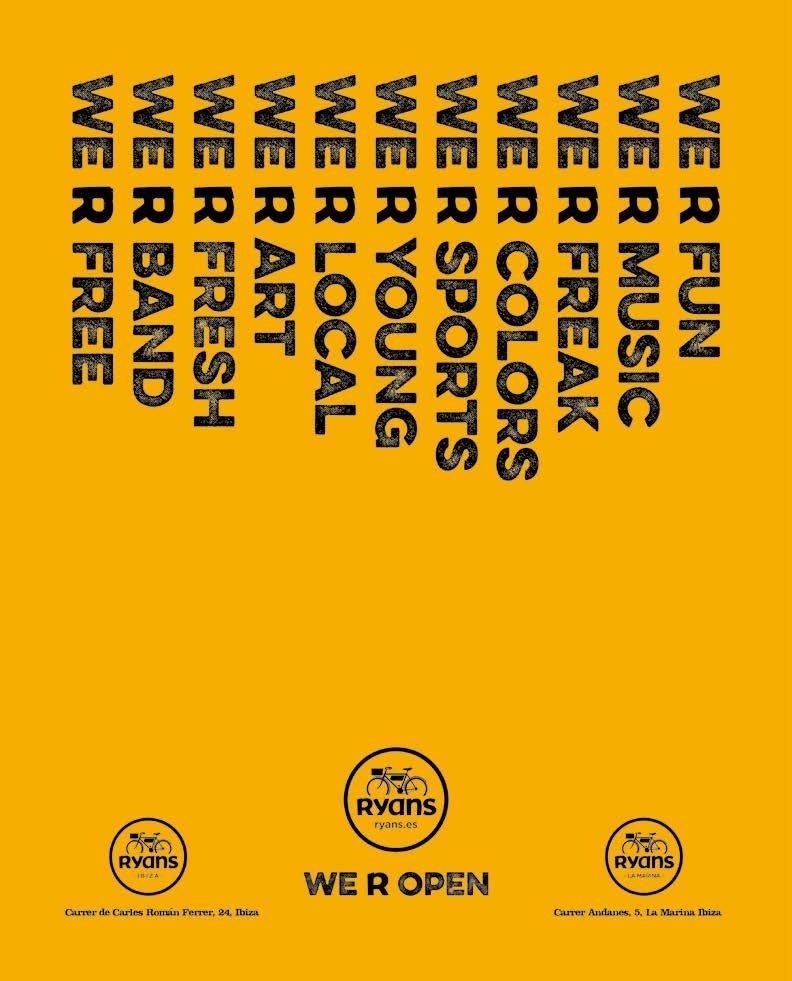
way of understanding fashion.
people everywhere began to follow this pattern as a new
were dismantled under the influence of his creative mind,
When the dividing lines between luxury and streetwear
dystopian scenarios found in the big neighbourhoods.
began in hip hop and skate culture, as well as in the most
a “post-streetwear” movement. It is an aesthetic that
street fashion. Something that, in fact, he has called
Abloh is considered to be one of the pioneers of “high”
VIRGIL ABLOH
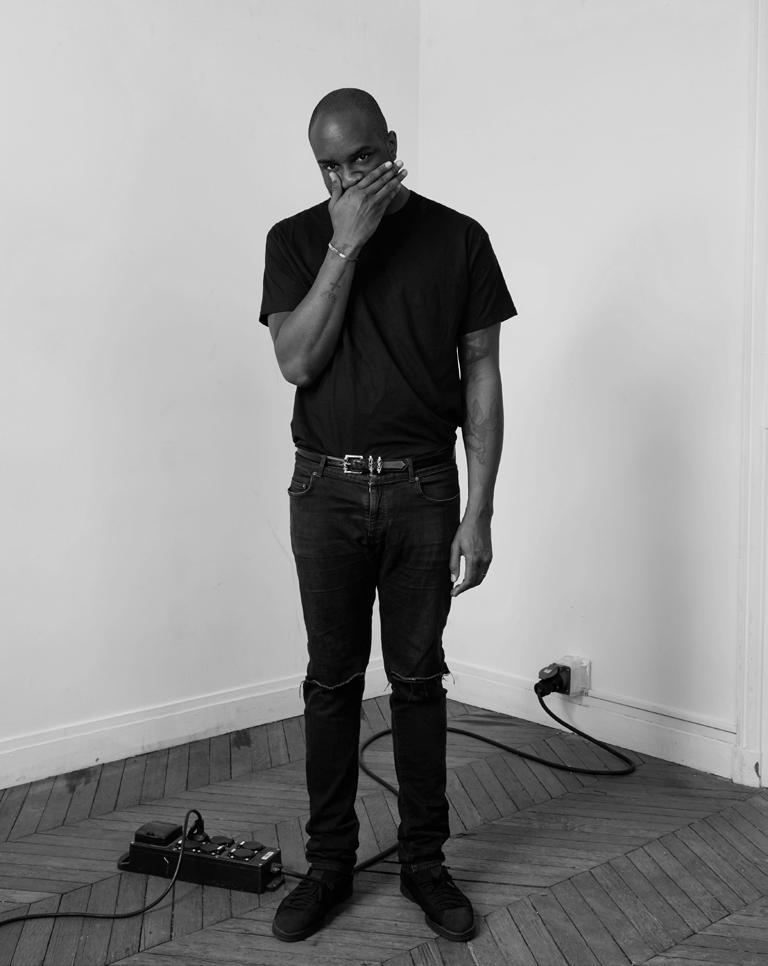
& design: Álvaro González
entender la moda. Text
bajo la influencia de su mente creativa, en todas partes se
Cuando se derribaron estas líneas entre el lujo y el streetwear
de los grandes barrios.
hip hop y skate, así como en los escenarios más distópicos
“post-streetwear”. Una estética que se originó en la cultura del
callejera. Algo que, de hecho, él ha llamado un movimiento
comenzó a seguir este patrón como una nueva forma de 1980 2021 061
Abloh es considerado uno de los pioneros de la “alta” moda
HISTORY
Virgil Abloh, despite his short life, has become one of the great icons of modern culture, and that’s so much more so when we talk about fashion, of course. His personality and his approach, which have proved exceedingly popular and impressive in contemporary design, have made history in every way.
Firstly, by laying the foundations for streetstyle in the straitjacketed world of luxury. And later, as the first person of African descent to take over the management of the legendary French firm Louis Vuitton.
Hugely well known for his industrial, urban, casual and almost countercultural style, Virgil Abloh is nowadays considered to be one of the most influential and respected designers. Especially if we are talking about the millennial generation. His impact and his personality are such that he has rightly been compared to the greatness of Karl Lagerfeld. Find out more about him below.
Virgil Abloh, pese a su corta vida, ha sido uno de los grandes iconos de la cultura moderna, mucho más cuando hablamos de moda, por supuesto. Su figura y su criterio, en exceso populares e impactantes en el diseño contemporáneo, han hecho historia en todos los sentidos.
Primero, sentando las bases para el streetstyle en el encorsetado mundo del lujo. Y después, como el primer afrodescendiente en tomar la dirección de la mítica firma francesa Louis Vuitton.
Conocidísimo por su estilo industrial, urbano, desenfadado y casi contracultural, Virgil Abloh es considerado hoy el diseñador más influyente y respetado de la actualidad. Especialmente si nos referimos a la generación millennial. Su impacto y su figura son tales, que justamente se le ha comparado con la grandeza de Karl Lagerfeld. Descúbrelo.
Beginnings
Virgil studied civil engineering and then went on to earn a master’s degree in architecture from the Illinois Institute of Technology. Interested in postmodern architectural style and deconstructivism, the designer combined the knowledge of sewing that he had acquired from his mother with what would be his greatest destiny: fashion design.
Inicios
Virgil estudió ingeniería civil y después continuó con una maestría en Arquitectura dentro del Instituto de Tecnología de Illinois. Interesado en el estilo arquitectónico posmoderno y del deconstructivismo, el diseñador conjugó las enseñanzas costureras que obtuvo de su madre con lo que sería su más grande destino: el diseño de moda.
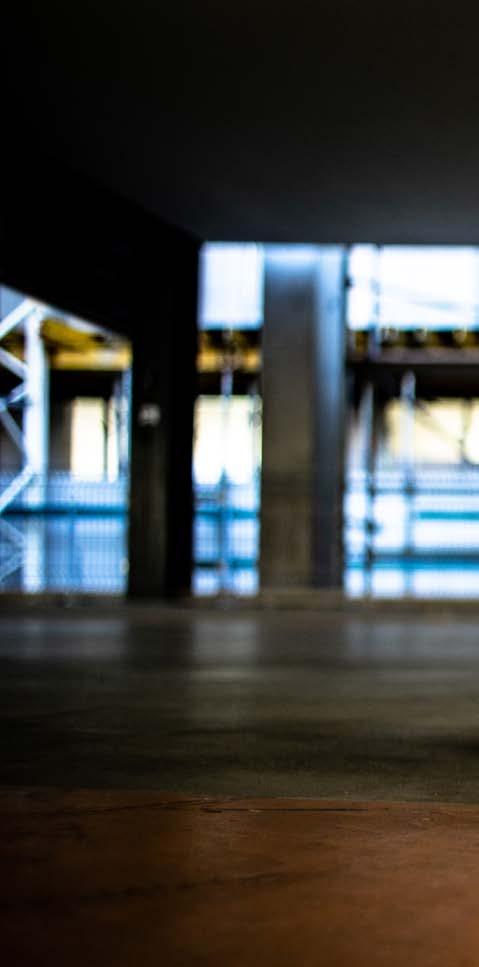
First steps as a designer
Inspired by his own mother, his studies, and Chicago street culture, Abloh began to explore the world of fashion by designing T-shirts. At the same time, he was contributing to a popular urban fashion blog: The Brilliance.
Primeros
pasos como diseñador Inspirado por su propia madre, sus estudios y la cultura callejera de Chicago, Abloh comenzó a explorar el mundo de la moda diseñando camisetas, al mismo tiempo que contribuía en un popular blog de moda urbana: The Brilliance.
062 Report
“I like errors they are like the expression adding humanity back into things.”
“Me gustan los errores, son como la expresión que devuelve la humanidad a las cosas”.
Kanye West
He also started out as a graphic designer in Chicago, and during that time, Abloh met Kanye West, who immediately recognised his creativity and talent. West asked him to work on the merchandising and visuals for his Graduation album. That was how he started a friendship that was combined with hip hop.
También comenzó como diseñador gráfico en Chicago, y durante este tiempo Abloh conoció a Kanye West, quien inmediatamente reconoció su creatividad y talento. West le pidió que trabajara en el merchandising y los visuales de su álbum Graduation. Así fue como inició una amistad que, combinando hip hop.
Internship at Fendi
In 2009, Abloh and West began a period of internship at Fendi. It was there that the two of them learned about practically every aspect of design. And that was where Michael Burke, the former CEO of Louis Vuitton, saw his work for the first time.
Pasantía en Fendi
En 2009, Abloh y West comenzaron un periodo internados en Fendi. Fue allí en donde ambos se educaron en casi todas las áreas del diseño. Fue ahí mismo donde Michael Burke, ex CEO de Louis Vuitton, vio por primera vez su trabajo.
First brand
Abloh’s first venture to found a fashion brand was in 2012, when he launched a company called Pyrex Vision. His mission was to appeal to youth culture, producing hyper-popular everyday clothing with a new twist.
Su primera marca
El primer esfuerzo de Abloh por emprender una marca de moda fue en 2012, cuando lanzó una empresa llamada Pyrex Vision. Su misión era apelar a la cultura juvenil, produciendo ropa de diario e híper conocida con un nuevo giro.
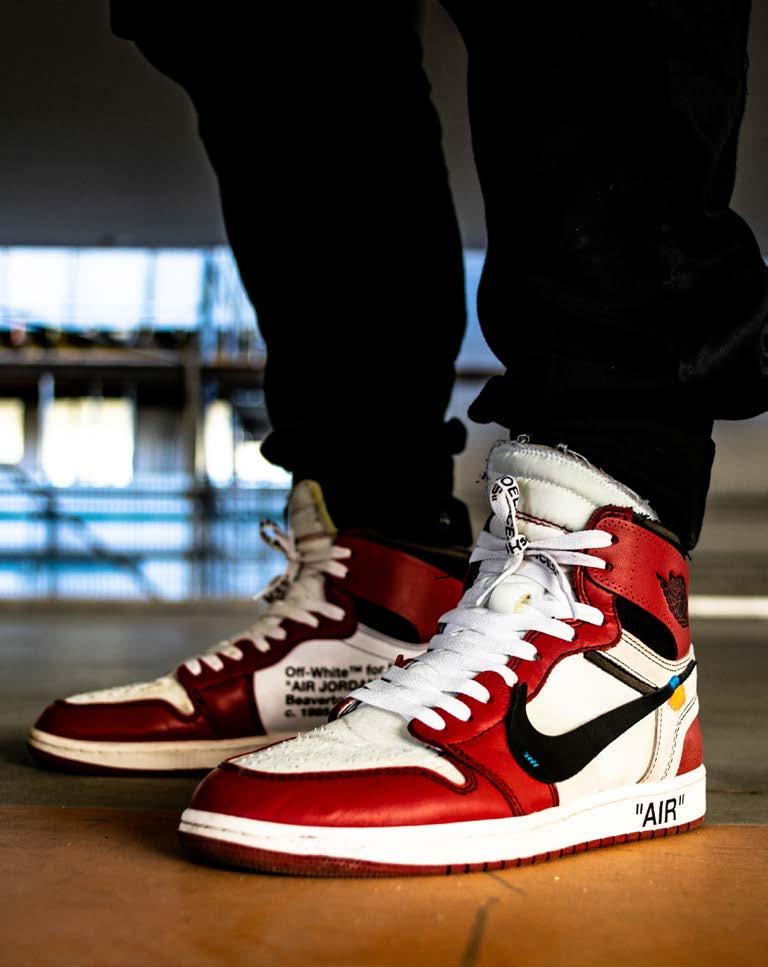
063
Nike Air Jordan 1 Retro High x OFF-WHITE “Chicago”
OFF-WHITE

“Pirex was a group of kids invading lower Manhattan an making the sort of city they saw. And that was mixing established designers with streetwear brands that were sort of owners of their own space. But the combination made something new. It attempted to document that sort of pivotal moment in culture. The feedback toward me was like “Oh, there’s room for a new type of fashion design”. And with that, I started Off-White, as this seasonal fashion, sort of language concept, post this idea of streetwear”.
I see the term “streetwear” as more of a catchphrase to define a way of making than what people might determine it as a style of clothing. In my eyes, its an art movement, less a fashion trend.
I decided my fingerprint was how the work is positioned. You know, and I use this overriding sort of construct between tourist and purist to sort of categorize the type of work that im trying to do. A purist can find value in meaning based on an underlying premise. Whereas a tourist has curiosity, ambition and is willing to sort of seek out, tor sort of pacify that need to see something or to know about it. So, I like to make work that attracts both.
I don’t feel responsible to preconceived notion of art. I feel more responsible to a community that is trying to change the tide or to sort of live in an optimistic society that art, design, music and fashion actually change the world for the better.
“Pirex era un grupo de niños que invadían el bajo Manhattan y creaban el tipo de ciudad que vieron. Y eso fue mezclar diseñadores establecidos con marcas de streetwear que eran una especie de dueños de su propio espacio. Pero la combinación hizo algo nuevo. Intentó documentar ese tipo de momento crucial en la cultura. Los comentarios hacia mí fueron como “Oh, hay espacio para un nuevo tipo de diseño de moda”. Y con eso, comencé Off-White, como una forma de moda de temporada, una especie de concepto de lenguaje, un concepto post ropa de calle”.
Veo el término “ropa de calle” más como un eslogan para definir una forma de hacer que lo que la gente podría determinar como un estilo de ropa. A mis ojos, es un movimiento de arte, más que una tendencia de moda.
Decidí que mi huella digital era cómo se coloca el trabajo. Ya lo sabes, uso este tipo de construcción primordial entre turista y purista como una manera de categorizar el tipo de trabajo que estoy tratando de hacer. Un purista puede encontrar valor en el significado basado en una premisa subyacente. Mientras que un turista tiene curiosidad, ambición y está dispuesto a buscar o apaciguar esa necesidad de ver algo o saber sobre ello. Entonces, me gusta hacer trabajos que atraigan a ambos.
No me siento responsable de la noción preconcebida del arte.
Me siento más responsable ante una comunidad que está tratando de cambiar el rumbo o de vivir en una sociedad optimista en el que el arte, el diseño, la música y la moda realmente cambian el mundo para mejor.
“Estos 10 zapatos se diseñaron en un día, no en el sentido de los detalles, pero hablo de la premisa como si tuviera que tener un carácter instantáneo y quiero hacer que todos estos zapatos de diferentes épocas parezcan uno. Irónicamente no soy un perfeccionista. Si se parece en un 80% a lo que pienso en mi cabeza, estoy contento. Paso al siguiente proyecto”.
064 Report
OFF-WHITE x Nike “The Ten”
“These 10 shoes were designed in like a day not in a sense we’re like the details but I talk about the premise like I had to have the ethos instantly and I want to sort of make all these shoes from different times look as one. Ironically im not a perfectionist. If its looks like 80% of what I think in my head then I’m happy. I’m on to the next project.”
@off____white
Fashion impact

In 2018, Abloh made history when he was named artistic director of the men’s ready-to-wear line at Louis Vuitton. That made him the first person of African descent to hold such a prestigious title. That same year he appeared on Time magazine’s list of the 100 most influential people in the world.

En 2018, Abloh hizo historia cuando fue nombrado director artístico de la línea de prêt-à-porter masculino en Louis Vuitton. Eso le convirtió en la primera persona afrodescendiente que ostentaba tan prestigioso título. Ese mismo año apareció en la lista de la revista Time de las 100 personas más influyentes del mundo.
The farewell of Virgil
On November 28, 2021, at the age of 41, he sadly passed away from cancer (cardiac angiosarcoma), a disease he had been battling in private for the previous two years.
El adiós de Virgil
El 28 de noviembre de 2021, a los 41 años de edad, lamentablemente falleció a causa del cáncer (angiosarcoma cardíaco), una enfermedad ante la cual luchó durante los últimos dos años de manera privada.
Echa un vistazo al director artístico masculino Virgil Abloh tomando las decisiones finales con su equipo 6 días antes de uno de sus desfiles.
065 Get a look at Men’s Artistic Director Virgil Abloh making final decisions with his team 6 days before one of his shows.
“The process and the end product are equally as valuable. I embrace imperfection as much as I embrace the pursuit of perfection”.
“El proceso y el producto final tienen el mismo valor. Acepto la imperfección tanto como la búsqueda de la perfección”.
Dj Career

Although fashion was Virgil’s wheelhouse, it would be remiss not to touch on his DJ career. Growing up in Chicago, he would spend time listening to the likes of Giles Peterson and Benji B, with the latter eventually joining up with him at Louis Vuitton in the role of music director. Speaking to The Guardian, Abloh explained the significance of DJing in his hectic life, saying, “[DJing] is my only peace of mind. When the phone is off, I play my favorite songs really loud for myself and I’m not talking to anyone, I’m not managing anything; it’s just like a time when I can listen to music...”

Aunque la moda era la timonera de Virgilio, sería negligente no mencionar su carrera como DJ. Al crecer en Chicago, solía pasar el tiempo escuchando a gente como Giles Peterson y Benji B, y este último finalmente se unió a él en Louis Vuitton en el papel de director musical. En declaraciones a The Guardian, Abloh explicó la importancia de ser DJ en su agitada vida y dijo: “Poniendo discos es mi única forma de paz mental. Cuando el teléfono está apagado, pongo mis canciones favoritas muy alto y no estoy hablando con nadie, no estoy gestionando nada; es simplemente como un momento en que puedo escuchar música...”
Ikea Collection
Collection of furniture and objects created together with Henrik Most (creative director of Ikea) that introduces an ironic message in the pragmatic line of Scandinavian design. All this stems from the ambition to bring art to everyday objects.
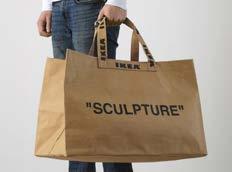
Colección de muebles y objetos creada junto a Henrik Most (director creativo de Ikea) que introduce un mensaje irónico en la pragmática línea del diseño escandinavo. Todo ello nace de la ambición de llevar el arte a los objetos cotidianos.
Grammy nomination
In 2011, Kanye West hired Abloh as the creative director of his creative agency, DONDA, where he was responsible for designing a slew of album covers – among them “Yeezus” and “My Beautiful Dark Twisted Fantasy”. Of Abloh’s kinship with the rapper, however, the artwork for “Watch the Throne” is perhaps one of the most memorable. With the help of Riccardo Tisci, Abloh conceptualised the gold-foiled artwork for Jay Z and Kanye’s project, scoring the designer a Grammy nomination for Best Recording Package.

En 2011, Kanye West contrató a Abloh como director creativo de su agencia creativa, DONDA, donde fue el responsable de diseñar una gran cantidad de portadas de álbumes, entre ellas “Yeezus” y “My Beautiful Dark Twisted Fantasy”. Sin embargo, del parentesco de Abloh con el rapero, la obra de arte de “Watch the Throne” es quizás una de las más memorables. Con la ayuda de Riccardo Tisci, Abloh conceptualizó la obra de arte dorada para el proyecto de Jay Z y Kanye, lo que le valió al diseñador una nominación al Grammy por Mejor Paquete de Grabación.
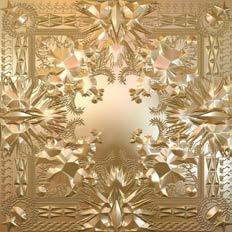
“Abloh had a mantra, the 3 percent rule, where he would take a pre-existing designand tweak it a 3 percent for an explosively transformative effect.”
Boiler Room London DJ Set 066 Report

067
Es literalmente cierto que
Usted puede tene mejor y más rápido

Ayudando a otros a tener éxito.
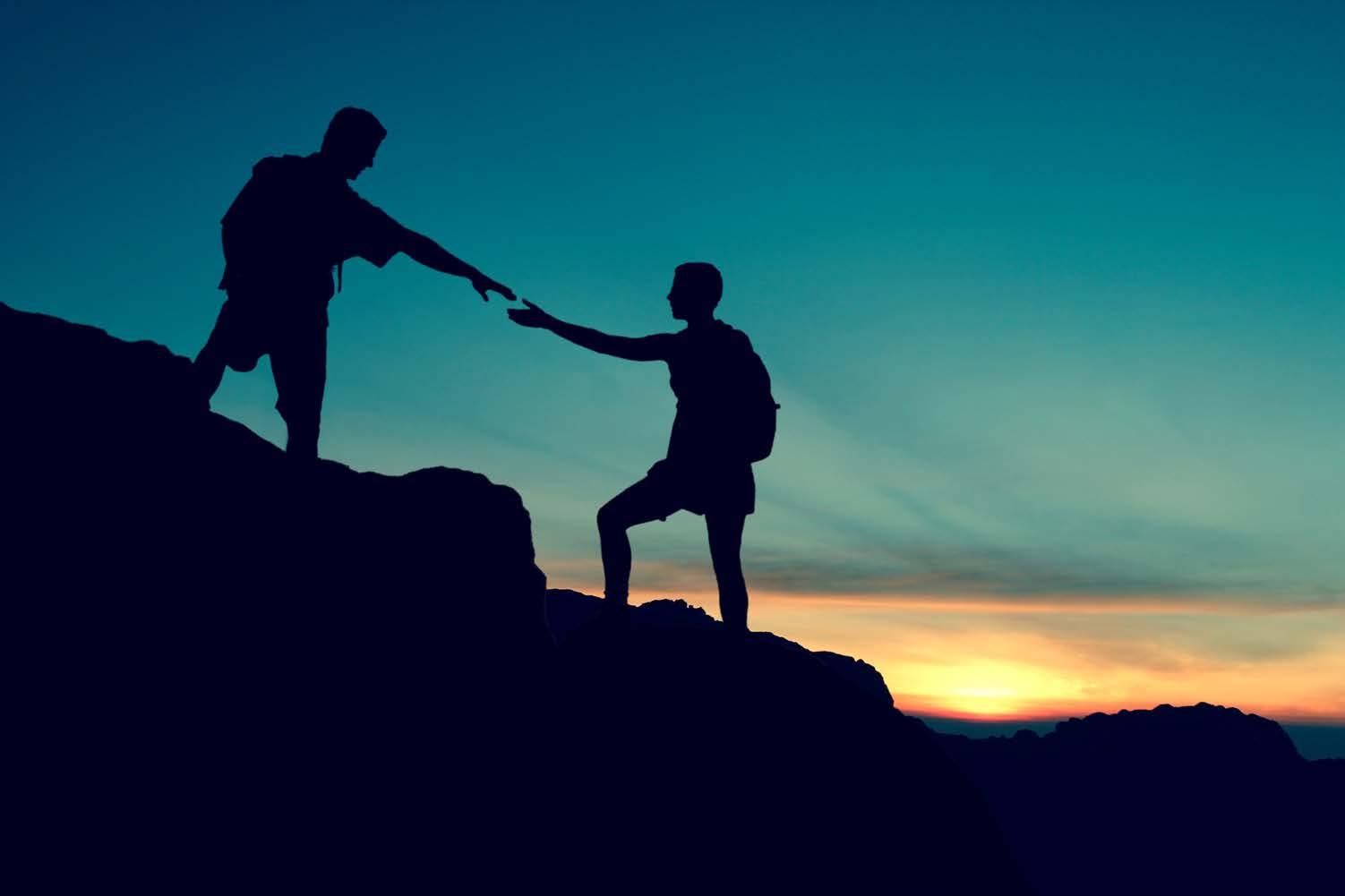 N. Hill
N. Hill

<< La empresa de servicios más ágil, eficiente y humana del
>>
es
mercado
info@blacks
La Seguridad es...




www.bullseguridad.es
''La tranquilidad de saber que están de todo peligro, daño o riesgo.''
PROTEGIDOS TÚ y tus intereses

070 Text: Jonatan Gutiérrez

071
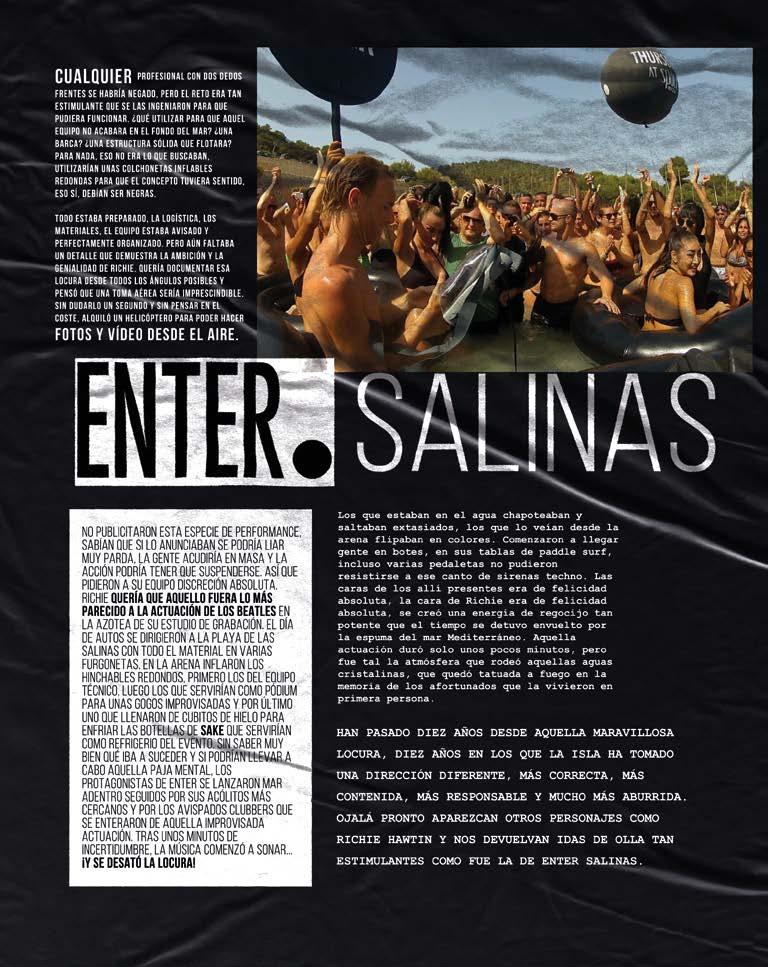
072 Report

Formada inicialmente como arquitecta antes de dedicarse al arte, Stella Rahola Matutes sigue tratando en su obra la creación de entornos y explorando técnicas artesanales como el vidrío soplado. Su trabajo lleva al límite la materia, su cambio y habla de colaboración, de perdida, producción y conocimiento.
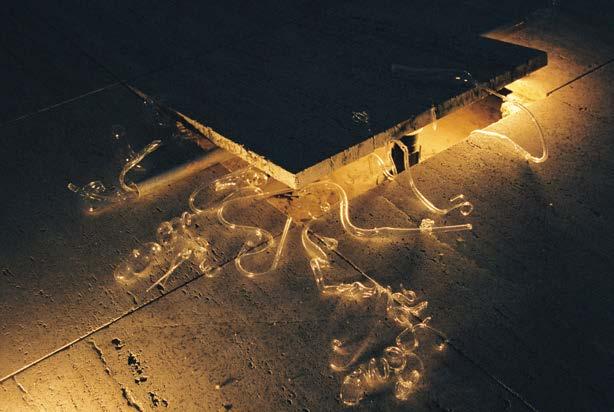
RAHOLA
Having initially trained as an architect before dedicating herself to art, Stella Rahola Matutes continues to deal in her work with the creation of environments and the exploration of handcraft techniques such as blown glass. Her work takes matter to the limit, the way it changes, talking about collaboration, loss, production and knowledge.
Interview by Silvia Aparicio
074
Beautiful Failures
Stella Rahola
¿Qué querías ser de pequeña? ¿Qué pasó o lo conseguiste?

De pequeña ya era una persona muy inquieta. Tuve muchos sueños pero siempre se mantenía el deseo de que una vez jubilada me dedicaría a la pintura (risas). Mi abuela, Carmen Aguadé era pintora. Disfrutaba mucho utilizando su material del taller para hacer mis cosas y ya de mayor ayudándola en su trabajo.
What did you want to be when you were young? What happened or did you achieve it?
When I was young, I was already a person with great curiosity. I had many dreams but I never stop wishing that, once I had retired, I would devote myself to painting (laughs). My grandmother, Carmen Aguadé, was a painter. I used to really enjoy using her workshop materials to make my things and, once I was older, helping her in her work.
075
Fig JuiceStella RaholaExpo. Far de la Mola, Formentera.
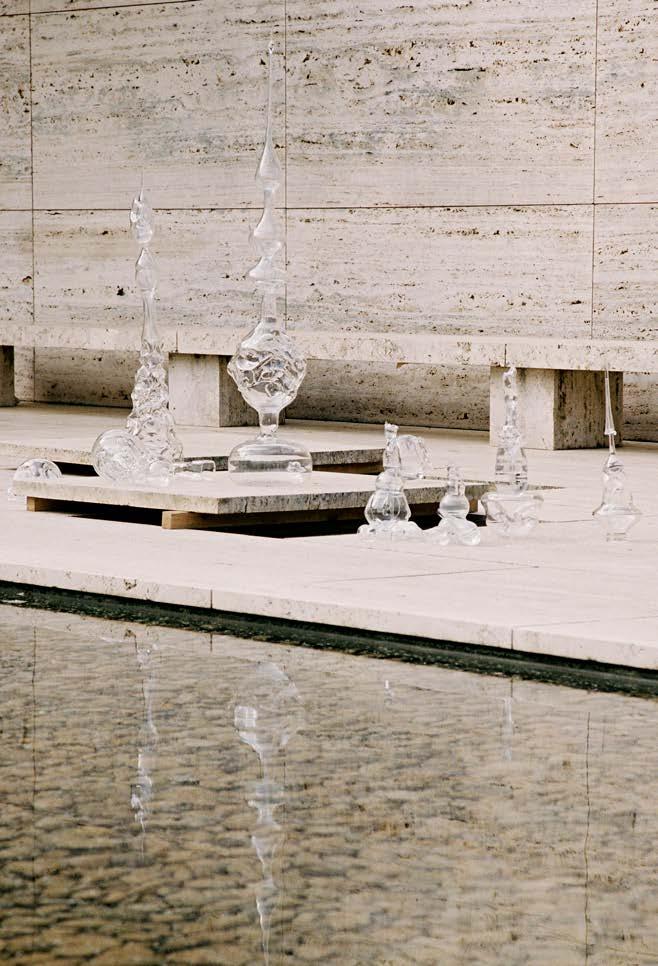
076 Interview Beautiful Failures -
Stella Rahola
¿Qué has estudiado?
Precisamente porque tenía intereses compartidos en la vertiente técnico-científica y en humanidades-artística, estudié arquitectura (ETSAB, UPC Barcelona y Accademia di Architettura di Mendrisio, Suiza). Unos años más tarde hice el Máster en Proyectos Arquitectónicos en la ETSAB, y ahora estoy terminando el máster en arte MFA en la Goldsmiths University of London.
¿Qué te inspira a la hora de crear?
En nuestra sociedad capitalista, el consumo representa la cobertura de nuestras necesidades y nuestro bienestar. Por el contario, creo que el hecho de hacer cosas por nosotros mismos es lo único que realmente puede satisfacernos. En este sentido aquello que está relacionado con la manualidad y la transformación de las cosas y muy especialmente la materia, es decir partir de algo informe, me sirve para encontrar preguntas y es en parte donde se genera mi trabajo.
Mi formación como arquitecta me ha vinculado mucho a un interés constante sobre el paisaje. Como es un lugar, como lo construimos y entendemos acaba siendo una de las expresiones físicas más vinculantes a la antropología. Me interesa hablar de nosotros a partir de este construir.
¿Dedicas unas horas fijas al día o es según te surge?
Dedico muchas horas, no solo al día sino fines de semana inclusive y hago pocas vacaciones.
¿Qué materiales utilizas?
No descarto ninguno. Aunque ahora uso mucho el vidrio.
¿De qué obra te sientes más orgullosa?
What did you study?
Precisely because my interests were shared across the technical/scientific side and in the humanities/arts, I studied architecture (ETSAB, UPC Barcelona and the Accademia di Architettura di Mendrisio, Switzerland). A few years later, I did a Masters degree in architectural projects at ETSAB and I am currently finishing an MFA (Master of Arts) at Goldsmiths University in London.
What inspires you when it comes to creating something?
In our capitalist society, consumption represents taking care of our needs and our welfare. On the other hand, I believe that the act of making things by ourselves is the only thing that can really satisfy us. In this sense, whatever is related to handwork and transforming things, in particular material things, that is to say to start from something that has no shape, helps me to find questions and is, in part, where my work comes from.
My training as an architect has connected me closely to a constant interest in the landscape. What a place is like, how we build it and conceive of it ends up being one of the physical expressions that is most linked to anthropology. I’m interested in talking about us on the basis of this construction.
Do you devote a set time each day or does it depend on how it emerges?
I devote many hours, not only each day but also weekends, and I take few holidays.
Of what work/set are you proudest?
Each project entails some difficulties that are also related to a personal context. Each one represents an apprenticeship as well as a challenge to overcome.
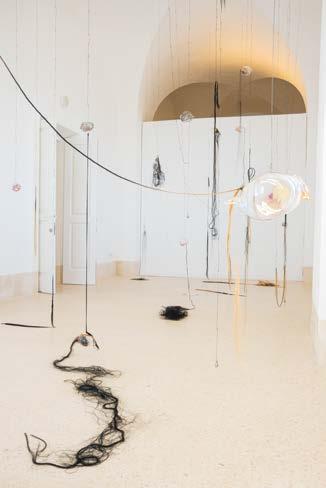
What materials do you use?
I do not disregard any.
077
REPRESENTA UN APRENDIZAJE Y TAMBIÉN UN RETO DE SUPERACIÓN. “
CADA PROYECTO ENTRAÑA UNAS DIFICULTADES QUE TAMBIÉN ESTÁN RELACIONADAS CON UN CONTEXTO PERSONAL. CADA UNO
Fig Juice
Stella RaholaExpo. Far de la Mola, Formentera.
¿Qué artistas sigues? ¿Cuáles consideras (históricamente) realmente interesantes/rompedores que abrieron vías nuevas?
En la actualidad y por los temas que persigo me interesan mucho Alicja Kwade, por su mirada arquitectónica y escultural de conceptos de representación de la realidad a través del simulacro; Saskia Olde Wolbers por su relación entre el trabajo análogo con el mundo de la ficción digital; o Lee Bul por sus estudios maquetaescultura sobre el fracaso de las utopías urbanísticas modernas.
Duchamp revolucionó la historia de arte con sus “ready-mades” y su famoso urinario. Su práctica ha desencadenado una multitud de influencias y desarrollos muy patentes en muchos artistas de la actualidad. Yo me sitúo precisamente en su contra y en el reivindicar la manualidad, la transformación de la materia, empezar algo que aun no tiene forma para encontrarla. Se trata de una reivindicación política personal, que pretende trascender al observador.
¿Qué encargo te hicieron para OD Hotels?
Para OD Hotels me encargaron una pieza que acompañara el diseño de las habitaciones y también obra para los espacios comunes. Pienso que el diseño de OD Hotels es muy cuidado, muy cálido y personal. En estos encargos busco una obra capaz de armonizar, acompañar y singularizar la experiencia del visitante.
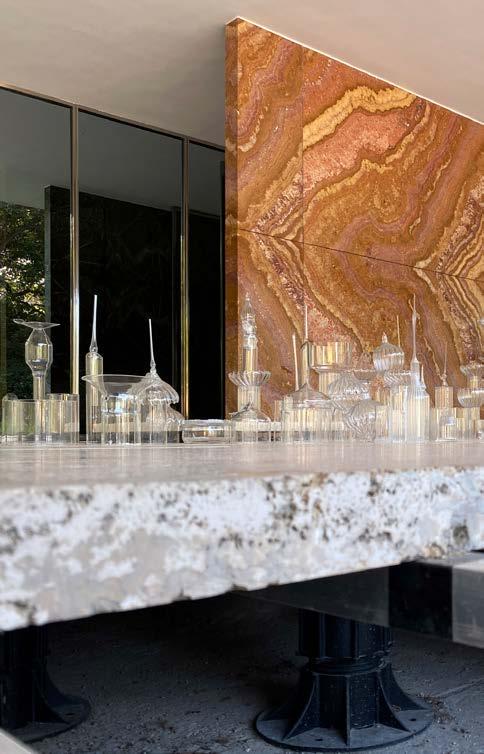
¿Con qué artista fallecido te hubiese encantado tener una conversación y por qué? ¿Y vivo?
Disfrutaría mucho reuniendo al escritor y crítico inglés John Ruskin y al sociólogo estadounidense Richard Sennett, para discutir sobre la artesanía en el s.XXI.
¿Crees que hay tendencias dentro del arte?
No. Precisamente la contemporaneidad, que se describe por una desorientación moral, perdida de certezas y caos, ha provocado un despliegue en la búsqueda de experimentación y multiplicidad de expresiones artísticas. Vivir en Londres precisamente me permite observar y vivir este paradigma. A nivel creativo vivimos un momento ecléctico muy rico.
¿Crees que te puedes definir como artista? ¿Qué te gustaría que pusieran en la Wikipedia de ti como definición?
El artista es una persona que está en una búsqueda constante. Espero que siempre sea difícil clasificarme. Tampoco es mi trabajo hacerlo.
Interview
078
Beautiful Failures - Stella Rahola
Which artists do you follow? Which ones do you consider (historically) to be really interesting/groundbreaking or who opened up new ways?
Right now, and owing to the subjects that I am following, I’m very interested in Alicja Kwade for her architectural and sculptural outlook on concepts of the representation of reality through simulation; Saskia Olde Wolbers for the relationship she establishes between analogue work and the world of digital fiction; and Lee Bul for his model/ sculptural studies on the failure of modern urban utopias.
Duchamp revolutionised the history of art with his “ready-mades” and his famous urinal. What he did has unleashed a multitude of very clear influences and developments in many artists nowadays. I place myself directly against him in reclaiming handwork, the transformation of material, beginning something that there is still no way of finding. It is a personal political demand that seeks to transcend the observer.
WHAT DID OD HOTELS COMMISSION YOU TO DO?
For OD Hotels, they commissioned me to do a piece that would accompany the design of the rooms as well as a work for the common spaces. I think that the design of OD hotels is very detailed, very warm and personal. In these jobs, I seek to create work that is capable of bringing harmony, accompanying and individualising the visitor’s experience.
With which deceased artist would you have loved to have a chat and why? And which living artist?
I would take great pleasure in meeting the English writer and critic, John Ruskin, and the American sociologist Richard Sennett, to talk about handcrafts in the XXI century.
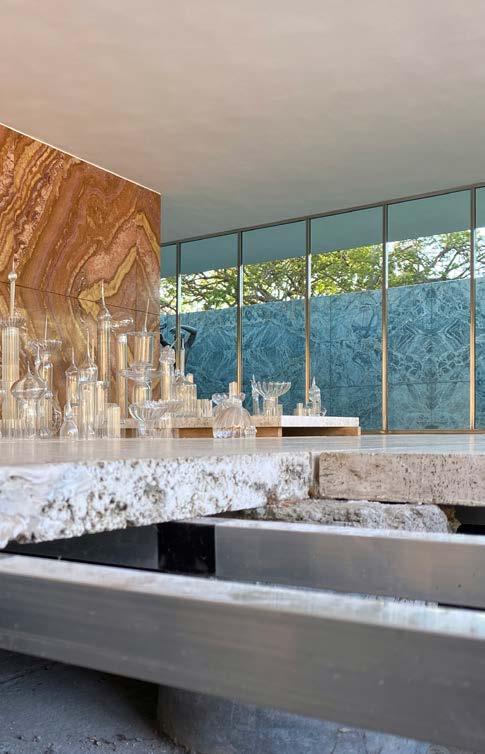
Do you believe that trends exist within art?
No. It is precisely the contemporary nature of things itself, which is characterised by moral disorientation and a loss of certainties and chaos that has provoked an unfolding in the search for experimentation and the multiplicity of artistic expressions. Living in London is precisely what allows me to observe and experience this paradigm. On a creative level, we are experiencing a very rich eclectic moment.
Do you think that you can define yourself as an artist? How would you like yourself to be defined in Wikipedia?
An artist is a person who is on a constant search. I hope that it is always difficult to classify me. Nor is it my job to do so.
079
¿Qué cambiarías en el mundillo del arte?
Muchas cosas. En el mercado del arte, el artista es imprescindible, sin él no existe el objeto de intercambio. Sin embargo es la figura más vulnerable, dentro de la rueda de mercado económico y también dentro de la sociedad. Así que habría que cambiar muchas cosas. Podríamos empezar por pagar al artista cuando se le encarga una exposición. Del mismo modo que todas las personas que están implicadas en el proyecto, desde el comisario/a, gerencia, persona de limpieza etc. reciben una retribución económica por su labor, el artista tendría que contar con el mismo derecho. No hay que seguir pensando que la compensación es su ampliación de currículum. La institución o galería también se aprovecha de su trabajo!
¿Qué proyectos tuyos podemos ver ahora mismo? ¿y futuros?
Ahora mismo se puede visitar en el MACBA (Barcelona) la obra Fig Juice (Zumo de higo) y en el MACE Co (NH2)2 / Babelia, ya como parte de la muestra permanente se puede ver y esta también se expuso en el Far de la Mola. Estoy preparando una exposición individual para la Fundación VilaCasas con motivo del Premio de Escultura 2021 que gané. Y Preparando una colectiva para el Palau Solleric, en Palma de Mallorca. Además ahora, junto con la Fundación Mies Van der Rohe, estamos preparando la publicación de la intervención en el su pavellón con Roger Paez y los estudiantes del MEATS Elisava. Además de en los hoteles OD Hotels de Madrid, Barcelona e Ibiza.
What would you change within the world of art?
Many things. In the art market, the artist is vital; without him or her, the object of exchange does not exist. However, he or she is the most vulnerable figure within the circuit of the market economy and also within society. Therefore, many things would have to change. We could start by paying the artist when they are commissioned to do an exhibition. In the same way that all the people who are involved in the project, ranging from the person who commissions it, the management, the cleaning staff etc. receive a financial reward for their labour, the artist ought to count on the same right. We should not carry on thinking that the compensation lies in their CV getting longer. The institution or gallery also takes advantage of their work!
WHAT PROJECTS OF YOURS CAN WE SEE RIGHT NOW? AND IN THE FUTURE?
Right now, you can see the work Fig Juice at the MACBA (Barcelona) and at the MACE Co (NH2)2/Babelia. It can be seen as part of the permanent exhibition, and it was also exhibited at Far de la Mola. I am preparing a solo exhibition for the VilaCasas Foundation that is to do with the 2021 Sculpture Prize that I won. And I am preparing a collective for the Palau Solleric, in Palma, Mallorca. What is more, together with the Mies Van der Rohe Foundation, we are now preparing the publication of the participation in its pavilion with Roger Paez and the MEATS Elisava students. That’s in addition to the OD Hotels in Madrid, Barcelona and Ibiza.
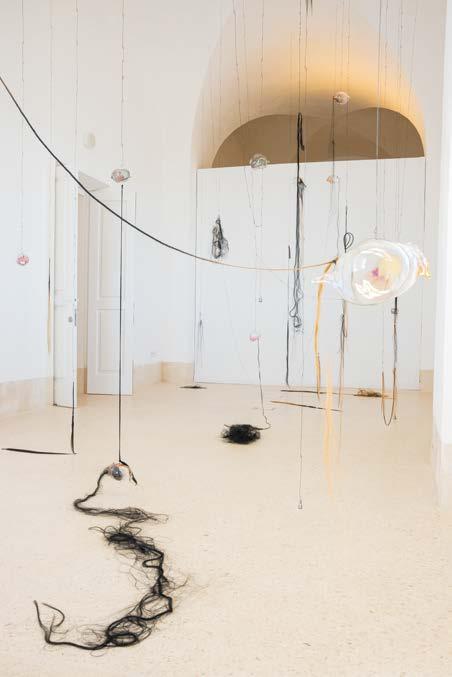
080 Interview
Fig Juice - Stella Rahola - Expo. Far de la Mola, Formentera.

081 PROJECTS INTERIOR info@kaudex.com (+34) 965 827 104 @Kaudex_contract Made for you Creative space Smart solutions Healthy ambients OD Madrid
JAVIER FERREIRA DIEGO MONTIEL
¿Ciudad de nacimiento y años como Dj? Nací en Buenos Aires y llevo desde el 2004 como DJ profesionalmente cobre mi primer gig en 2006.
¿Tú primera actuación fue en? ¿Qué recuerdas?
Mi primera actuación “oficial” que recuerde fue en mi ciudad Buenos Aires, en el barrio de San Telmo. Una fiesta organizada con amigos que la llamamos “Der Keller”. Recuerdo que al no tener experiencia fui con un mix en donde había preparado el orden de mis tracks y pese a que nos divertimos muchísimo y la pasamos súper, desde ese día me di cuenta que mis mixes deben ser espontáneos e improvisados al 100% para llegar al punto de conexión y empatía que quiero en la pista. Me sirvió de mucho ese primer acercamiento.
¿Cómo conociste a Diego?
A Diego lo conocí a través de Martin Noise, un amigo y dueño del label “Playground records”, quien nos puso en contacto para que le haga unos trabajos de mastering sobre el antiguo label que tenia Diego, antes de lanzar Side Up Works (su actual label). Yo en ese momento me encontraba viviendo en Buenos Aires y luego cuando me vine a Barcelona, nos conocimos personalmente.
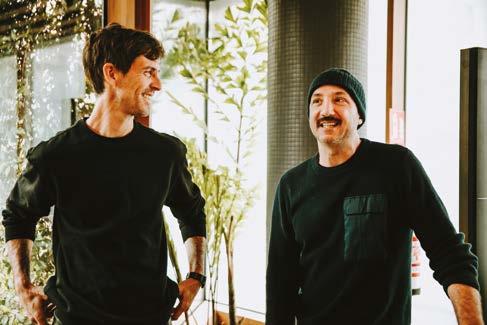
Conectamos mucho y hasta el día de hoy seguimos trabajando juntos en muchos proyectos entre los cuales se encuentra la escuela BeSide School.
¿Tus influencias musicales (grupos, djs, discos) de joven y ahora?
Comencé escuchando punk rock y a tocar la batería desde los 12 años con mis primeras bandas. Luego a medida que fui creciendo y habiendo trabajado como baterista de sesión, conocí muchos estilos y también al tener un estudio de grabación y trabajar como productor de muchas bandas me empapé de todos los
géneros musicales. Soy muy abierto en ese sentido y un día puedo escuchar reggae, al otro día jazz y al día siguiente death metal. Igualmente, siempre tuve mis bandas de cabeceras como Radiohead, Air, Massive attack, y el género “indie” en todas sus ramas. Hoy por hoy podría decir que ese estilo es el que mas me identifica y me nutre de ideas musicales.
Si llevas a Diego a tu ciudad, ¿Qué no se puede perder?
Primero lo llevaría un recorrido por la ciudad que es hermosa. Palermo, San Telmo, el centro de la ciudad son clásicos que no pueden faltar. Una buena pizza en “La Mezzeta”, “Guerrin” o “El Fortin”. Pero algo (para mi punto de vista) que caracteriza a la ciudad es la diversidad y calidad de eventos culturales que hay. En pocos lados he vivido tantas buenas fiestas y gente predispuesta a pasarla bien como en Buenos Aires.
El clima de fiesta es muy contagioso. ¿El track que siempre te funciona en la pista de baile?
Soy de tratar de no repetir mucha música en la pista. Si un track me funciona bien, lo puedo llegar a repetir un par de veces mas y ya. Me gusta el desafío de cosas nuevas (soy de sagitario). Podría decirte que algún track de mi hermano Gabriel nunca falla, en cualquier momento que lo ponga funciona. Suelo pasar mucha música de mi label “Ninefont” que siempre me funciona. Particularmente de mis tracks me gusta mucho pasar “Ss Hh Aa Kk Ee Ii Tt” lanzado por el label United Colours Of Rythm.
¿Tu próxima actuación/lanzamiento que te quita el sueño?
Actualmente estoy cerrando una gira latinoamericana bastante extensa que comprende (por ahora) mas de 14 gigs en 1 mes y medio.
Venia con ganas de hacerla hace mucho tiempo, y como sabemos, la pandemia paro todo, así que podría decir que hoy por hoy ese sería el gran sueño a cumplir en mi carrera profesional como Dj. En cuanto a la producción, lo próximo a salir confirmado será en el label mexicano “Duro”, y en el label madrileño “Rotten City” que son sellos que respeto mucho y tenia ganas de colaborar en ellos desde hace un tiempo.
Javier Ferreira
082 Interview
PH—Astrid Bosch
Diego Montiel
¿Ciudad de nacimiento y años como Dj? Buenos Aires y más de 17 años de Dj a nivel profesional.
¿Tú primera actuación fue en? ¿Qué recuerdas?
Mi primera actuación fue en una nave industrial en el barrio de Poble Nou, Barcelona y recuerdo que justo al llegar iba pensando por donde se entraría al recinto, y justo allí unas amigas me gritan Diego, desde la pala de una grúa, y me quede pensando como se treparon y se les ocurrió sentarse allí arriba, ja ja, luego las ayude a bajar y me mostraron la entrada, ya dentro también recuerdo que me llamo mucho la atención que la cabina estaba toda rodeada con ese tipo de tejido de alambre para cercar un terreno, era alto de cómo dos metro y las vayas que lo sostenían tenían bases muy grandes de cemento, en nada amaneció y la gente se agolpaba sobre el tejido de alambre a modo zombies tal cual pasa en algún que otro capítulo de Walking Dead, la cosa era que el tejido se tambaleaba con el peso de la gente y los que se apoyaban en el y muchas veces llegue a creer que se caería todo sobre las tornamesas, la fiesta duró 12 horas, una autentica Rave, en ese momento Barcelona era mucho mas libre y con menos restricciones que hoy día.
¿Cómo conociste a Javier?
Por medio de la música claro esta, invite a Javi a pinchar en una de nuestras fiestas SUW , que es la fiesta de mi sello Side UP Works, que se celebró en el club This Side UP, en la avenida Parallel , en el barrio céntrico de Poble Sec, en Barcelona, el Tío se marco un magnifico dj set y de allí que hicimos buenas migas hasta que luego le comente sobre mi proyecto de enseñanza que ya estaba bastante encaminado y decidimos unir fuerzas y compartir sociedad en el área de producción musical de ese proyecto que es se convirtió en la actual BeSide School, escuela de donde han egresado varios de los djs que hoy día están moviendo el underground barcelonés y también varios productores que han firmado para reconocidos sellos.
¿Tus influencias musicales (grupos, djs, discos) de joven y ahora? He tenido una etapa adolescencia muy Grunge e Indie, luego me sume al movimiento del Nu metal, y forme parte de una banda del estilo la cual me llevo a salir por primera vez de mi natal Buenos Aires e instalarme en New York por un mes por y para hacer música, luego me mude a
Europa y los platos llegaron a mi casa por querer hacer Scratch para la banda de Hiphop donde cantaba y rapeaba, pero poco a poco cuando iba a la tienda por vinilos , me fui comprando mas y mas discos de electrónica de productores como The Hacker con quién he tendido el agrado de pinchar y hacerle el closing set, luego de su contundente actuación, también tenia discos de Jennifer Cardini y su sello Correspondant, con quién también he tendido el placer de compartir cabina, y otros tantos vinilos de Rex The dog, quién ha venido a hacer su live set en nuestra Fiesta Suw, también tenia algunos trabajos discográficos de Ewan Pearson, quién 15 años después ha editado en mi sello y también me gustaba mucho Vitalic y Miss Kittin entre otros. Actualmente tengo la enorme suerte de que mis artistas favoritos como MARC HOULE, DAMON JEE, DANNY DICE, THEUS MAGO, STEPHAN BARNEM, ZOMBIES IN MIAMI, DARLYN VLYS Y CURSES entre otros, todos han podido pasar por mis fiestas SUW y han editado en mi sello Side Up Works, todos ellos excelentes productores y muy buena onda como personas.
Si llevas a Javier/Diego a tu ciudad, ¿Qué no se puede perder?
Considero a mi ciudad Barcelona, ya que es la que me vio convertirme en hombre, o hacerme responsable por decirlo de alguna manera, jaja y lo que no se puede perder si alguien la visita es claramente un plato de chipirones en alguna taberna de toda la vida en la Barceloneta, así como
una tarde en el Park Guell, para luego pasear por el Barrio de Gracia y el fin de semana imperdible comer una buena barbacoa o si es temporada unos buenos Calçots en algún restaurante tradicional cerca de Collserolla.
¿El track que siempre te funciona en la pista de baile?
Pues, Red Room que es un track original de THEUS MAGO & MODERNA, remixado por EWAN PEARSON, editado en Side UP Work, una bomba siempre efectiva y atemporal que no te deja indiferente y te levanta un muerto, mira si será bueno que hasta nos los compró Primavera Sound para utilizar partes del mismo en sus campañas publicitarias 2021!
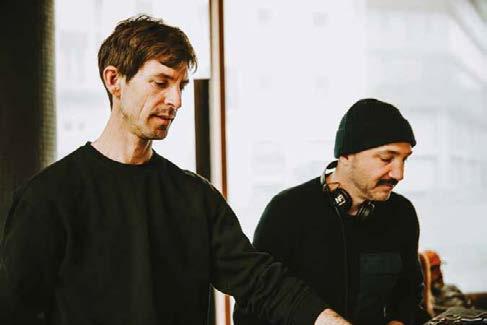
Y tengo otro levanta pistas asegurado, se llama MUSSMAN original de FIBERROOT remixado por DAMON JEE, efectivísimo, atemporal, contundente y fino, También editado en Side UP Works.
¿Tu próxima actuación/lanzamiento que te quita el sueño?
Muchas ganas de compartir cabina este 24 de Abril con LA MVERTE en SideCar, uno de los clubs mas emblemáticos y antiguos de la ciudad, donde no había tendido el agrado de pinchar hasta ahora, y como lanzamiento se vienen muchas bombas en mi sello con varios de los mas grandes del Dark disco y el Indie Dance Internacional, pero aunque esto me llena de felicidad el sueño me lo quita el nuevo trabajo que estoy preparando ya que es donde presentaré mi formula musical
como productor, basándome en un disruptivo balance entre Rock y techno.
083








Pasatiempos Industrial copera Club: Industrial Copera Address: C/ Desmond Tutu Parcela 13 City: La Zubia, Granada. Country: España Date of birth: 1992 WWW.INDUSTRIALCOPERA.NET @industrialcopera @despegando_industrialcopera 30 ANIVERSARIO



Recortable Clubs #2 El jardín Start your own club at home!!
サウンドラボ#29:ローランドファン トム-0。 全能のメーカーであるローランドを時々 このセクションに連れて行かないことは 事実上不可能です。この機会に、シンセ サイザー以上の、完全なシリーズを前面 に押し出します。新しいFantom-0は、現 在3つのマスターキーボード(06,07,08 )で構成されており、非常に多くのオプ ションが含まれているため、数行で分析 することは事実上不可能です。 より差別化された分析を行うことを目的 として、最も一般的な特性を説明するこ とから始めます。 この機会に、通常はサウンドの実験に焦 点を当てた一般的なシンセサイザーを扱 っていませんが、パターンと瞬間的な実 行の両方でシーケンスできるDAWでより 識別されます。
Fantom-0ラインには、神話上のリズム マシンから、アコースティックグランド ピアノと同じレスポンスとサウンドを備 えたピアノまで、完全なサウンドバンク が含まれています。これらはすべて16
レイヤーに分割されており、どのチャ ンネルにも制限なく割り当てることがで き、同時にサウンドを作成することもで きます。 タッチスクリーンから、サブメニュー内 を移動したり、トラックのシーケンスを 書き込んだり、必要なパラメータを変更 したりするためのすばらしい機能があり ます。これらのオプションに加えて、マ ルチモードフィルター、さまざまなプロ ダクションソフトウェアに完全に統合さ れたUSBオーディオインターフェイス、 そして最後に、まだ必要でない場合はボ コーダーを自由に使用できます。 目的:この強力なキーボードの範囲で できないことは直接ありません。最も 古典的な作品から最も未来的なスタイ ルまで。
最高:サブメニュー内での移動のしやす さ、およびシーケンスダイナミクスによ り、パターンの作成が高速で非常に動的 になります。 最悪の事態:このタイプのキーボードが 他の音楽スタイルほど電子シーンに統合 されていないのは残念です。キーボード に含まれる可能性の数は事実上無限であ るためです。
Desde la pantalla táctil disponemos de una facilidad pasmosa para movernos dentro de los sub-menus, así como para escribir las secuencias de nuestros tracks o modificar cualquier parámetro necesario. Junto a estas opciones tenemos a nuestra disposición un filtro-multimodo, interfaz de audio USB con integración completa en varios softwares de producción, y para terminar, si es que aún no fuera necesario, Vocoder.
Orientado a: Directamente no hay nada que no se pueda hacer en esta potente gama de teclados. Desde la pieza más clásica, al estilo más futurista.
Lo mejor: La facilidad de movimiento dentro de los submenus, así como la dinámica de secuenciación, hacen que crear un patrón sera rápido y muy dinámico.
Lo peor: Una pena que este tipo de teclados no estén tan integrados en la escena electrónica tal y como sí lo está en otros estilos musicales, ya que la cantidad de posibilidades que contiene son prácticamente infinitas.
Prácticamente imposible no traer cada cierto tiempo al todopoderoso fabricante Roland a esta sección. Para esta ocasión, más que un sintetizador, sacamos a la palestra una serie completa. La novedosa Fantom-0, compuesta actualmente por 3 teclados maestros (06,07,08) que contiene tal cantidad de opciones, que es prácticamente imposible diseccionarla en tan pocas lineas. Con la intención de hacer un análisis más diferenciativo, comenzaremos describiendo las características más generales. En esta ocasión no estamos ante un sintetizador común, normalmente enfocado a la experimentación del sonido, sino que se identifica más con un DAW dónde podemos secuenciar tanto por patrones, como por ejecución instantánea.
La linea Fantom-0 además incluye un banco de sonidos más que completo, en el que podemos encontrar, desde las míticas cajas de ritmos hasta pianos de respuesta y sonido idénticos al de un piano de cola acústico. Todos estos separados en 16 capas y que podemos asignar a cualquiera de nuestros canales sin restricción alguna, incluso haciéndolas sonar a la vez.
086 Laboratorio
Sonoro #18
Text: José María Moreno Vega www.djmania.es

ANDREA OLIVA

ISSUE 23 MAYJUNE 2022 FREE.






 Photo: @mario_pintaAwakenings
Photo: @mario_pintaAwakenings



































































































































 N. Hill
N. Hill





















